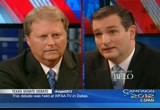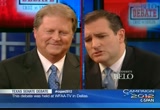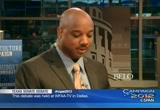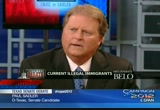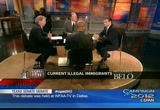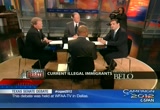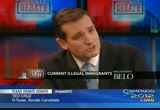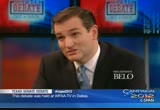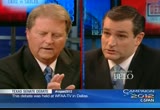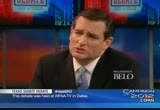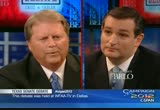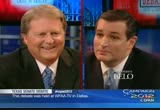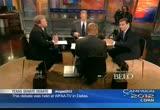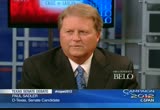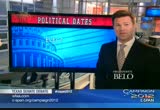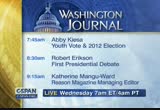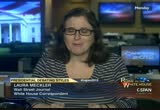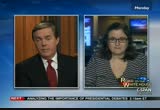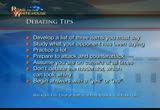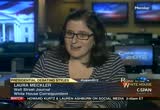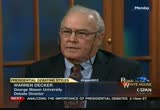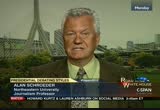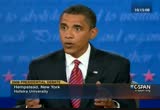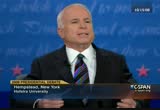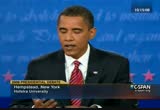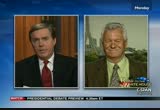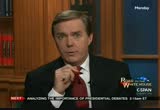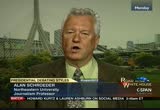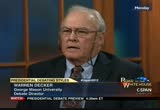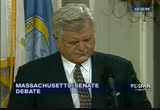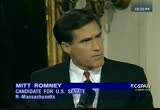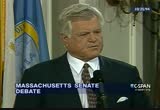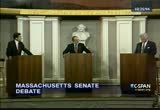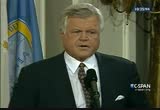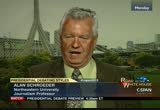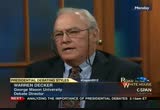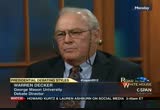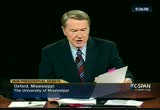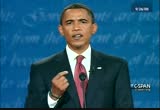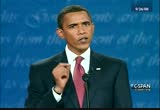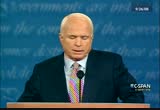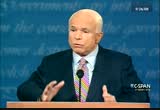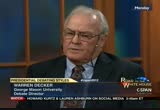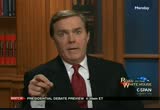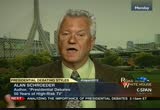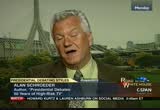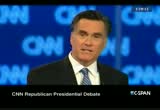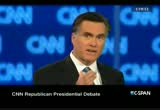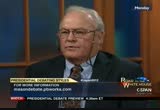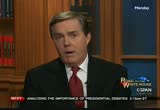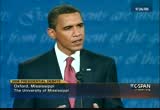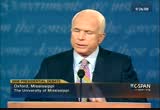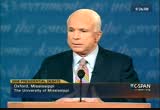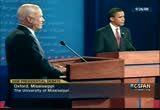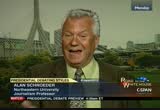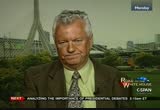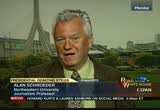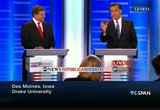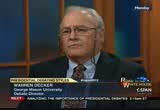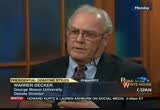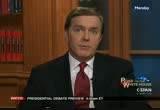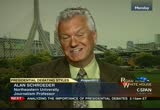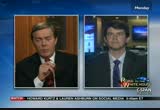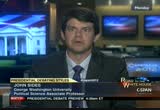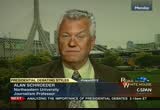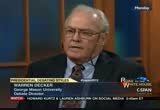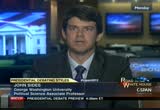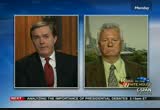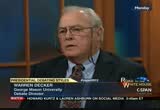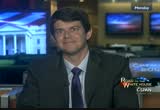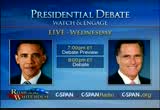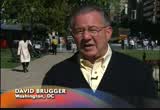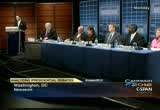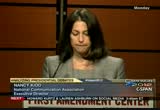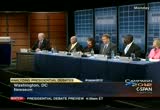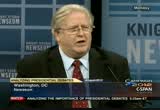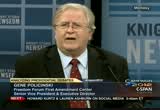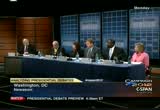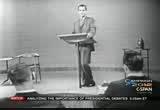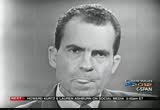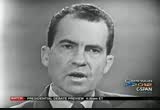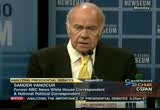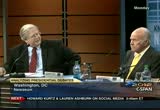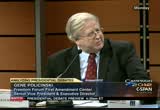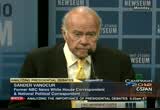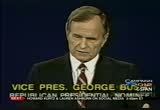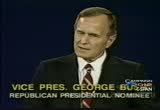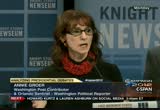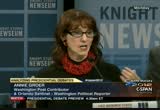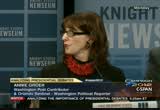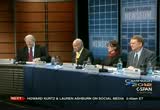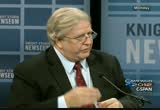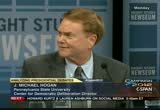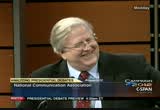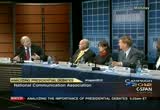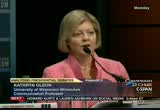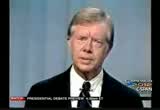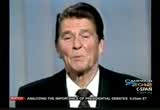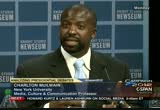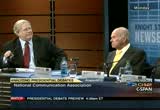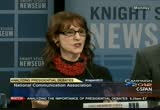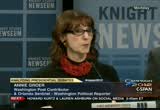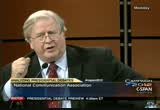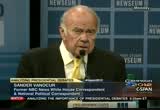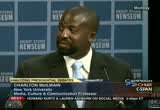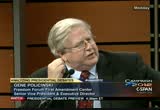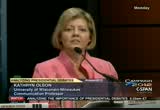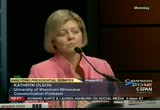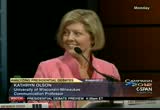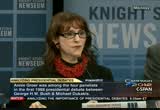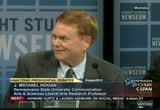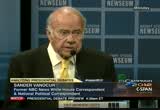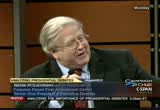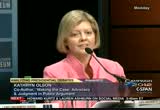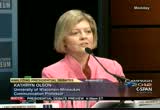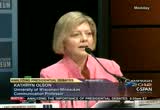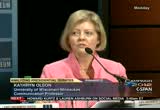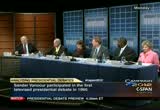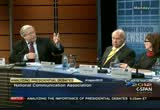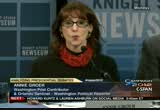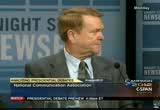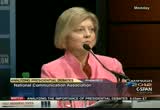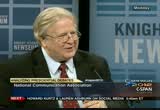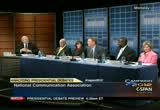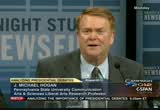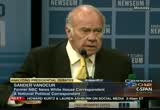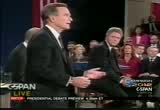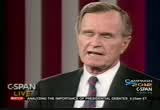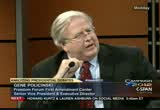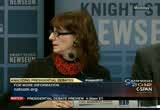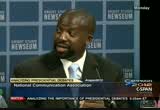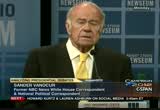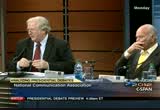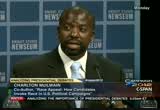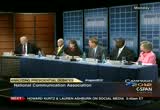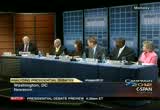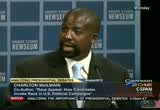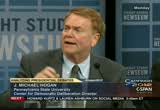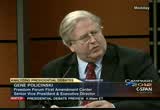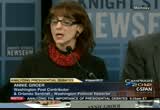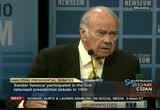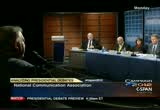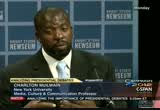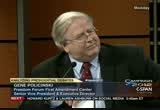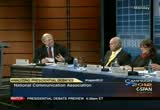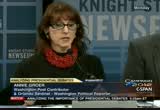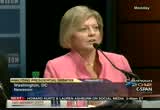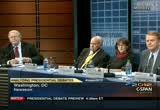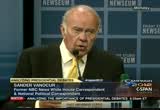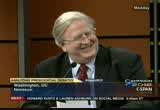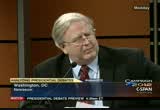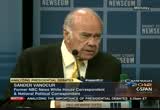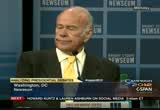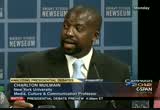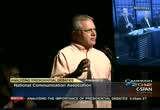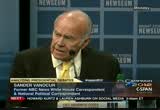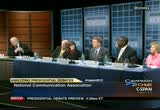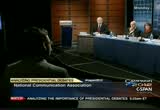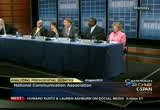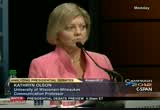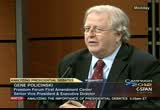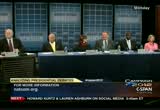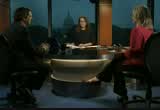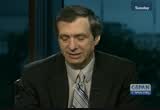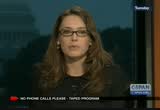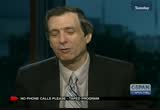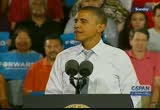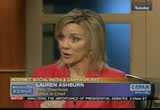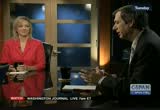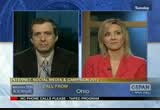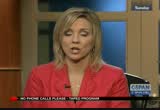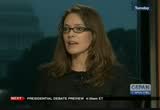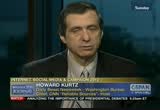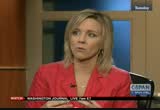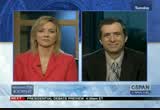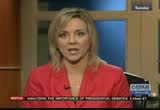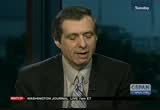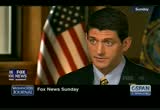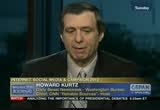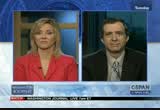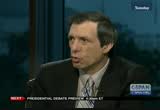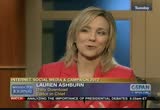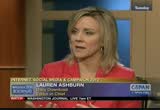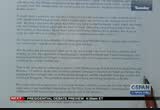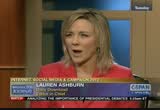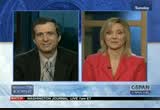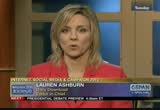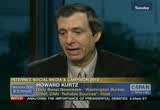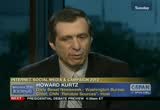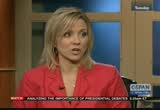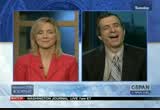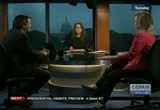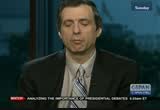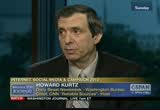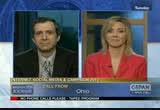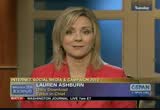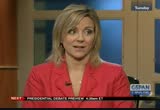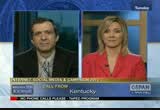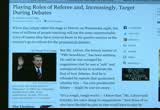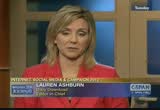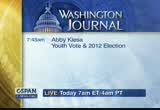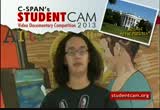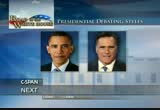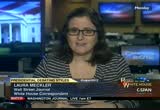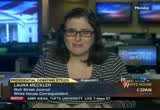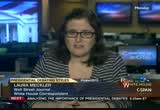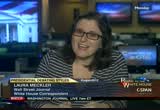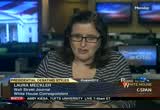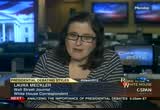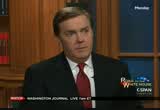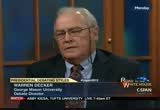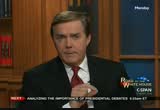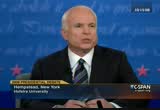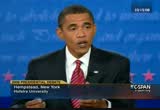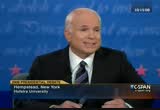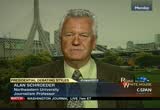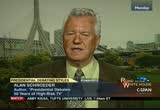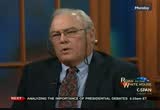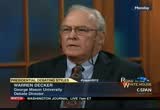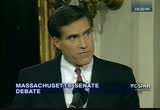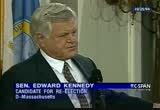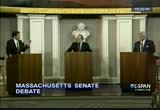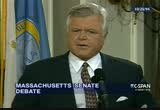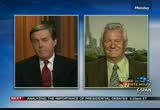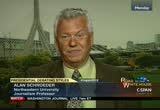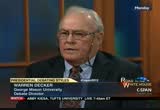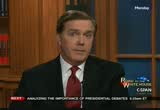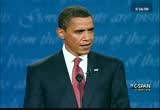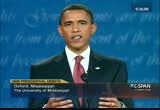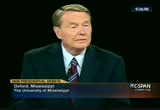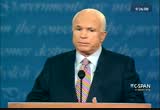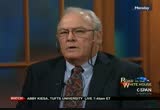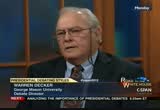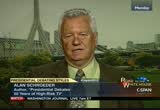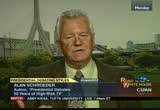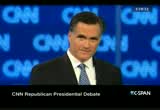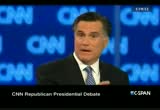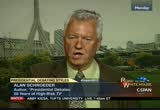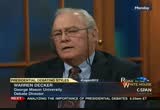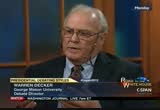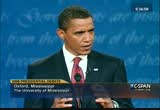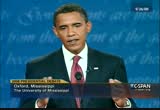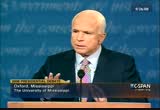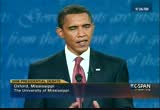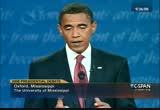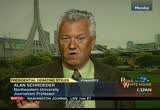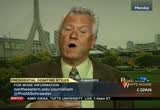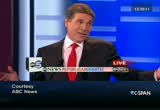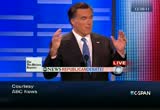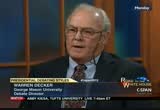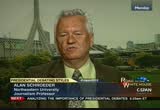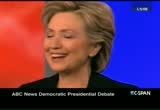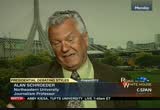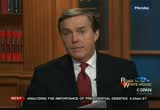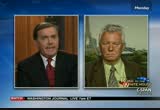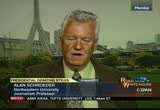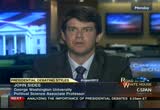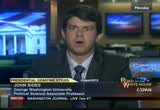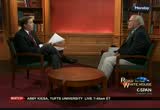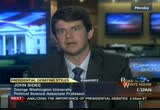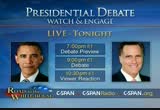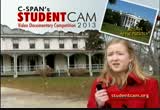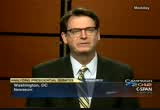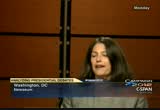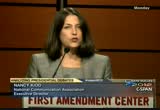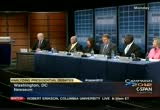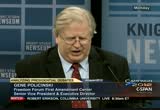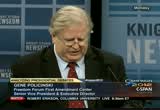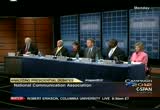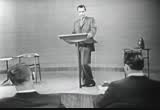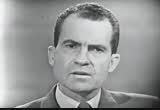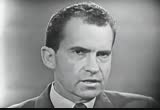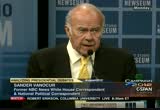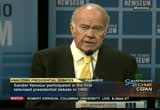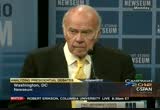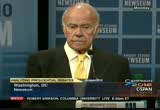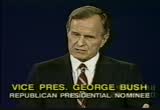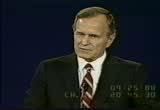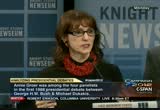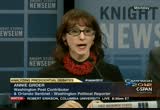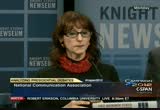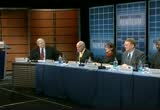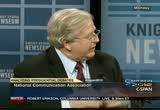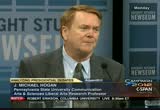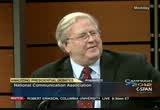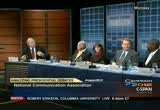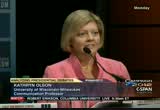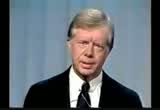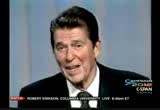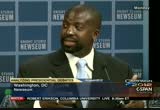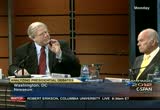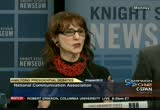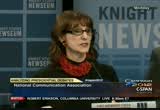tv Capitol Hill Hearings CSPAN October 3, 2012 1:00am-6:00am EDT
1:00 am
>> let me know when you are done. >> give me a response, what ever it is, and then will move monday to answer my question. why what you answer? >> because you keep interrupting. would you like an answer? >> tell me. >> tell me. >> he will give you a response. and it may not be what you want, but he is going to respond. >> john cornyn is a very good man and i look forward to working very closely to represent the state of texas and conservative principles. mr. sadler -- you want to ask who john cornyn is supporting. i would encourage you to, because i tell you, he has been campaigning -- >> you will not answer the question. >> i look forward to working with him side-by-side. on the other hand, let me ask
1:01 am
you, are you suggesting that you would not vote for a democrat as majority leader? >> i am telling you this. if i was a republican, i would vote for john cornyn. but all your money comes from jim demint and the super pac. that is his biggest competition. we all know that. you will not answer the question. >> jim demint has made it clear he is not running for leadership. what i said, i said i think it would be presumptuous for me to commit to a leadership vote until the election. you showed no hesitancy -- >> we are going to go on. in the next session, they will sort out their leaders in the next session. we are tentatively going to move on to immigration. >> mr. sadler, stopping illegal
1:02 am
immigration, there have been proposals like tripling the size of border patrol or building expensive fences or walls. however, there are 11.5 million illegal residents in our country today. 1.6 million in texas alone. illegal immigrants. do you support a path to citizenship for people here illegally enter yes i do. -- illegally? >> yes, i do. our border, a lot of texans may not know, el paso is the safest city its size in america. our border is a great economic engine, a great cultural factor, it is a diverse cultural region, and we cannot stick our head in the sand any longer. we need to secure our borders. that is our sovereign right. we should do that. that is our right. we have the military to do that, right there in el paso with equipment available to do so. by that, we have surveillance techniques capable that we can
1:03 am
utilize. the federal government should be doing it. but we have to -- we should have already passed the dream act for these children in this state who through no fault of their own are here. they have no country. all they want is the american dream. ted likes to talk about liberty, but he only wants liberty for people he agrees with. liberty for these kids means becoming a citizen. why we turned them down over and over is beyond me. we should pass the greenback. -- the dream act already. finally, we should have a worker program to identify people here. they should pay taxes. then we should have some kind of clear pathway. it does not mean the front of the line. we can make whatever requirements we want. but we cannot continue to stick our head in the sand. this is too important, too important for our state. if we do not do anything, we
1:04 am
will have the same discussion. >> mr. cruz, do you support a path to citizenship for the 1.6 texas? >> i do not. and let me say more broadly, i think there is a very clear divide. as i said before, i commend mr. sadler for running as an unapologetic liberal. illegals. i do not. he supports obamacare. i do not. mr. sadler has opposed second amendment rights. i fight for second amendment rights. >> what does that have to do with? he is going off on -- >> mr. sadler has championed on income tax and the state of texas. i oppose that. there is a sharp difference. that is good, becauseit gives texans a clear choice between what is right -- the right direction. >> so what would you do for the illegal immigrants here? do you see that as a problem? >> the texas home-building and restaurant industries are sensitive to that. >> immigration should have a staged approach.
1:05 am
i think the first priority is we have to get serious about security and stopping illegal immigration. sadly, i do not think either party has been serious about immigration. both parties have demagogued on it, but they have used it to rally their base rather than rolling up their sleeves in -- a andn -- and solving the problem. we need to remain a nation that does not as welcome, but celebrates our immigrants. over 50 years ago, my father came as an immigrant when he was 18, not speaking english, working as a dishwasher. >> i want to know, again, what would you do it for the illegal immigrants already here? mitt romney says self-deport during the primary. do you agree with that? do you agree with mass deportations? >> i think the first thing we
1:06 am
need to do is secure the borders, fix the problem. hold on a minute. but i said it is a staged approach. this second step related to that is put in place a strong verifying system so employers will face sanctions for hiring people illegally. and have a safe harbor if they comply with the system. if we drive up the job market, -- dry up the job market, if we secure the borders, that is how we solve that problem. >> you tell so many lies, it is unbelievable. you have accusations against me that are unbelievable. do you even own a gun, ted? do you hunt? when i say about the second amendment stuff -- >> is it true or false you voted against our concealed carry? in the state of texas? >> i support the second amendment? >> true or false. >> i can engage in the same cross-examination process you
1:07 am
did. did you vote against our concealed carry act? >> i do not want my grandmother who carries a pistol to be a felon. are you ok with that? >> that is a sharp difference. i got the freedom fund award for supporting the second amendment. >> he wants to talk all night, but the fact of the matter is that i am a big second amendment supporter. i have four boys who hunt. i hunt. i have defended the second amendment. you did not answer my question if you even hunt. >> we are trying to get a response to the question of illegal immigrants. you can respond to that, please, and we will save -- >> he went into a lecture about his father -- >> you made your point. >> the second amendment, all kinds of stuff. it is not my point -- it is in response to what he said. >> let him finish. >> do you disagree?
1:08 am
>> do not interrupt me, ted. >> do you disagree? >> -- >> i have stated my position on immigration and on the border. you have the worst policy for the border of anyone running for the united states senate. we have a very diverse state. we have a culturally diverse state. we have to resolve these issues so we can move forward as a state. you are sticking your head in the sand, about amnesty and things like that -- that does not help the situation. that does not help our border region. we have over $1 billion of legitimate commerce traded across the border every single day. yet you are scaring the daylights out of our border communities because of your policy. you even disagree with your wife, who served on a committee of the north american union of mexico, the united states, and canada. to give a free border pass across the borders. >> i am sorry, mr. sadler, that you feel obliged to attack my wife.
1:09 am
>> i am not attacking her. you disagree with her. >> i think that is unfortunate you are willing to go there. >> i am not attacking her. it is a document that she worked on with condoleezza rice. on the border. >> you are talking over each other. you respond. silence, please. i will let you respond, then we will begin to wrap up. go ahead and finish your point. begin. >> my broader point -- there is a sharp difference between mr. sadler and me. his policies, whether supporting gay marriage, supporting an income tax in the state of texas, and mr. sadler used to routinely introduce himself as being the guy who supports income-tax. >> that is just a lie, ted. that is an absolute lie. >> -- >> you said i introduced myself around the state as a person who supports income tax.
1:10 am
that is an absolute lie. >> no, it is not. >> yes it is. >> i never supported an income tax. i had the responsibility of looking at the tax system of texas, something you would not know anything about because you have never served in a legislature. you have never had the responsibility of putting together a school finance program. this was to pay for our children's education. i had to look at every single tax available, a sales-tax and income-tax, you name it. i have done it. so did the lieutenant governor at the time. that is something the lieutenant governor of the time said was our responsibility. you would not know anything about it. what you do not do is do your job as a legislator, worried problems will come along later, to try to run a campaign. >> i do not blame you. >> went over and over again, there is nothing else to suggest. that is all you do. >> there is nothing else to suggest that. i am sorry, mr. sadler, i think you lied. i am sorry you want to attack me personally. and impugn my character.
1:11 am
i do not intend to reciprocate. that is a misstatement. there's a sharp policy different between the policies you have advocated and are advocating. i also think -- >> let him finish, please. >> if you will stop him in a reasonable time -- he just goes on for 20 minutes. >> we only have two minutes left ear. we will try to wrap up. >> mr. cruz, if you are successful, you will be the junior senator for texas. as i have said before, there is a chance that by then obama will be reelected any chance the -- and a chance that democrats will maintain control of the senate. given the fact that you said earlier that you do not like to compromise, how can you be effective in that landscape? >> the premise of your question is not exactly right. i never said i do not like to compromise. what i said is, i said my
1:12 am
philosophy is the same as reagan's -- if they offer you half a loaf, you take it. i am happy to compromise with democrats, republicans, independents, libertarians, everyone. i am joked about compromising with martians. i would compromise if they are solving the problem. if they are shrinking spending and shrinking the debt. if god forbid barack obama is reelected and harry reid remains majority leader, i will fight every day to defend texas and free-market principles. i think there's a very real possibility that the obama administration will go directly after fracking, which is opening enormous oil and gas resources. >> one minute left, and we want mr. sadler to jump in. >> mr. sadler, you will join a most republican delegation from texas. how can you be effective or most of the members disagree with your policies? >> i do not in most of them -- i do not think most of them would disagree with my policies. i've the history of bipartisanship. it is a record of honor and
1:13 am
distinction. i was named 10 best. i was named by your newspaper one of six best legislators. every single law was passed in a bipartisan manner, with a republican governor, republican senate, democratic house. i have always worked together in a bipartisan manner. that is the value of my record. when you are looking at these two candidates, this is a person who has never been elected to anything. mr. cruz. i have a record you can look at. bipartisan record that you can look at. >> this election is a clear choice between the obama democrats, more spending, more debt, more government control, and going back to our founding freedoms. >> we need to get out of here. because we are out of time. thank you as always. >> thank you and thank you to both candidates. we want to leave you with a final note -- early voting begins oct. 22. just three weeks from now. the election is november 6. that does it for the belo debate from victory park in
1:14 am
dallas. for all of us, have a good night, everybody. [captioning performed by national captioning institute] [captions copyright national cable satellite corp. 2012] >> see the debate tomorrow night, and watch and engage. coming up next on c-span, a preview of the presidential debate. this is followed by examining the importance of presidential debates. >> tomorrow on "washington journal," a discussion of the role of young voters in the presidential election. abby kiesa is our guest, and then we hear from a political science professor of columbia university with a preview of tomorrow's debate between president obama and mitt romney, with robert erikson. "washington journal" wednesday
1:15 am
at 7:00 a.m. eastern on c-span. >> president obama and mitt romney are wrapping up their preparations for their first debate. mr. romney in denver and president obama in henderson, nevada. we look at the c-span archival video from past presidential debates to determine whether presidential debates still matter. this hour-long program begins with an update from wall street journal correspondent laura meckler, with how the candidates are preparing for tomorrow night. >> laura meckler, as we look at the first of three presidential debates, this one taking place on the campus of the university of denver, this has been the debate season of expectation by the obama and romney campaigns. what has happened?
1:16 am
>> the expectations are being set on two different levels. you have the obama and romney campaigns talking about how great the other guy is. the people in the obama camp cannot stop praising mitt romney. they do not like him in any other way. they think he is a brilliant debater. same on romney's side. they talk about how obama is a debate champion. and how he has set the standard. what they are trying to do is lower expectations for their own performance and talk about their own flaws a bit and raise expectations for the other guy hoping that we will judge the debate itself with that in mind. there is another set of expectations. how important are these debates? you have the romney campaign in a position where they need a game-changing moment. then you have the obama campaign saying this is just another moment for us to have another conversation with the american people. that is a downplaying of the expectations. for the debate itself.
1:17 am
>> you have been reporting about the separation is taking place for months, most notably when mitt romney was down during the democratic convention. and preparing for the debates in vermont. in your reporting, who is helping mitt romney and who is helping president obama? >> mitt romney is being held by a bunch of people. the senior strategist on his campaign. you have senator robb portman playing the role of barack obama. it is his job to get under romney's scan the way they expect obama to get under romney's skin. on the obama side, you have two white house veterans who are running the debate prep for president obama. you have senator john kerry, who has been there himself. >> what happens during these mock debates? >> they do not talk a lot about what happens during these.
1:18 am
what they try to do is try to set a situation that is as realistic as possible for the actual debate. they do it at the same time and night the debate will take place. they set up a set just like it will look like in denver. they are used the environment. they have somebody to play the moderator and ask questions. obama does not like sound bites. as his campaign will tell you. they force him to give answers. they do whatever they can to simulate the debate situation. >> you quote a former chief of staff to vice-presidents al gore and joe biden. let me read some of his points --
1:19 am
can you elaborate? >> sure. he is not really specifically using this advice for romney or obama, although i have no doubt many of these tips are being passed on to president obama. it is interesting. that was my first short summary of what he has to say. he went into more depth about each one of those things. impressions of the debate are formed very early. in the first half hour.
1:20 am
a lot of the reporters will be writing their stories in the first half hour. you need to come out strong. if there is something you want to say, you have to say it right away. you suggest candidates, when they come out to the stage, write down three points they want to make. when you are watching the debates, you see that. talking points in response to any sort of question. the idea of do not debated moderator is do not say, he got more time, i need more time. those things may be true but it doesn't look good. >> are those moments magnified in a nationally televised presidential debate? >> i think everything is. that is the issue. whatever you say, it is such a small moment. the president checking his watch. it looks like he had somewhere
1:21 am
else to be. it did not come off well. any small moment can be easily magnified, significant or not. >> many people refer to the 1960 debate between richard nixon and john kennedy as the first impression that each candidate made to the voters. in 2000, same thing between al gore. the split screen showing him signing to the responses of george w. bush. >> one of the things both campaigns talk about is this is a possible advantage for governor romney because there is an elevated factor for him. he is on the same stage as the president. these debates to make an impression. sometimes they have a lasting impression. often, they do not.
1:22 am
it is an opportunity, one of the few moments in the campaign, the conventions are another, but this is the last opportunity that both candidates have to speak to such a large audience at once. >> laura meckler, thank you for being with us. we have warren decker. he is from a university in fairfax, virginia. joining us from boston, a professor alan schroeder. he has 50 years of high risk tv. what makes a good debate and a good debater? >> i think the difference between a really good debate from my standpoint, intercollegiate debate, and debates we see at the presidential level is that a really good debate would be characterized by some depth of
1:23 am
clash and arguments back and forth between the two. a lot of that is missing from presidential debate. the testing of ideas comes from that clash. without that clash, i think the debates to not serve quite the punch. in presidential debates, the primary function they serve is to fill in the blanks in between, give the challenger and opportunity to be on the same stage, as laura was indicating. they serve a valuable function. comparing them to the types of debates at the collegiate level is unfair, i think. >> alan schroeder, you called this a high risk television. why? >> it is a television show more than a traditional debate. a debate is the word we have used.
1:24 am
back in 1961 they were doing the first one, the networks did not want to use the word debate because they thought it was misleading. they wanted to call it a discussion. it is high-risk because it is one moment during the campaign were the candidates are in a situation that they do not have 100% control over. they have control over their own performance but not what the other person will do. it is a juxtaposition of the choreographed and the spontaneous. that is what makes this so interesting. >> we have pulled together a couple moments from past debates as they campaign for presidency in previous years. you want to begin with october 15, 2008. here is part of the 2008 debate. >> the conversation i had with joe the plumber, what i said to him was, five years ago when you were not in a position to buy your business, you knew. what i want to do is make sure the plumber, the nurse, the
1:25 am
firefighter, the teacher, the young entrepreneur who does not have money, i want to give them a tax break now. that requires us to make important choices. not only to 98% of small businesses make less than $250,000, but i also want to give them additional tax breaks because they are the drivers of the economy. they produce the most jobs. >> you know what senator obama and adopt in a conversation with joe. we need to spread the wealth around. we will take it joe's money, give it to president obama, and let him spread it around. i want joe the plumber to spread it around. i want small businesses, that would receive an increase in their taxes right now. why would you want to increase
1:26 am
anybody's taxes right now? why would you want to do that? when we have such a tough time. the small business people are going to create jobs unless you take the money from them and spread the wealth around. i will not do that in my administration. >> if i could answer the question. number one, i want to cut taxes for 95% of americans. it is true that my current supporter warren could afford to pay a little more in taxes in order to give additional tax cuts to joe the plumber before he was at the point where he could make to hundred $50,000. exxon mobil made $12 billion record profits over the last several quarters. they can afford to pay a little
1:27 am
more so ordinary families who are trying to figure out how they will afford food, save for their kids' college educations, they need a break. nobody likes taxes. i would prefer none of us have to pay taxes, including myself. ultimately, we have to pay for the investments that make this economy strong. >> let's not raise everybody's taxes. the fact is, businesses and america today are paying second highest tax rate of anywhere in the world. our tax rates for business in america is 35%. ireland, and 11%. where are the company's going to go where they can create jobs and where they can do best in business? we need to cut the business tax rate in america. we need to encourage business. >> professor, you walked that
1:28 am
exchange. what is your take away -- you watched that exchange. >> professor alan schroeder, you watched that exchange. what is your take away? >> a couple of things. you get a sense of how relentlessly message to john mccain is. he used the term spread the wealth of around three times. another thing that strikes me is how obama is making eye contact with became the entire time he is talking. he looks right at them. there was a lot of discussion from the earlier debates in 2008 that mccain was having a hard time making eye contact. it came off as rude. another thing that jumps out on me is the contrast of the youthful obama and a much more senior mccain. obama actually was more the adult in my opinion in that relationship in that he was very calm and cool under fire. mccain, although that last debate was his best, he had moments where he was a little erratic and some of those earlier debates.
1:29 am
>> you said, both president obama and governor romney share a sense of trepidation about going mano-a-mano on live television. how may it went up boxing them in? >> neither one of them has and enjoyment of debating. that is a weird word to use. i think the ones who are really good at it and the ones who really come across of the people who get up on that stage and cannot wait to be there and are eager to make their case. bill clinton was like that. ronald reagan was like that. these two are not like that. for them, this is more, please do not let me do anything wrong, than, what can i do right? as was discussed earlier, he needs a dramatic moment to shift the momentum. if he is intimidated by the experience or feeling boxed in, he is less likely to do that. for obama, it is more a
1:30 am
question for maintaining his lead. he does not want to do anything right now that reverses the trajectory he is on. i would expect he is a little timid as well. >> if you look at past debates, one dealing with policy, the moment with gerald ford, the other is more style, where obama made a joke about his age. how much is policy and how much a style in these debates? >> i think probably my judgment would be a lot of it is stylistic. it is the way they come across to the voters. it is not necessarily as much what they are saying as how they are saying it. every once in awhile, it is
1:31 am
really more of a case of glitch avoidance. that has a lot to do with their handlers. responding and reminding them that the one thing they want to avoid is making any huge mistakes. i think probably, going back to the question in terms of style over substance, that what we would prefer in some ways to hear a lot about, detailed explanations about how each person is going to handle the economy, for example, that ultimately, given the times than they have, style is going to be a huge part of it. >> we looked for a couple of examples of mitt romney campaigning in a general election debate. one of the most notable, 1994, when he faced kennedy in massachusetts. here is one exchange between mitt romney and senator kennedy.
1:32 am
>> it was determined by a toss of the coin that mr. romney would pose the first question to senator kennedy. >> my impression has been you have followed a campaign as soon as the primary was over of trying to divert the voter's attention from the issues at hand and instead making personal attacks on me as unfounded. they are characterized as untrue, unfair, and sleazy. 12 are women in my firm. you are wrong. 12 are women, including our chief financial officer. he said we would give no benefits to americans. we have 40,000 employees in firms i am associated with to give health-care benefits appeared only part-time do not -- benefits. the strikers that you criticize me for where strikers at a company that was not invested in when i was at bain capital. you parade that around like it is my problem.
1:33 am
as the minimum wage, you say i'm not in favor of the minimum- wage. you have yet to produce any document that says i do not support the minimum-wage. when will this and? >> i would have thought that mr. romney would have asked me what i was going to do for working families in massachusetts, how we're going to get our economy on the road, exposing differences, talking about the measures are going to affect children, working families, our senior citizens. mr. romney, i will provide after this debate all the documentation you asked for and i hope you will tell me where you provide health insurance for your companies and overseas and finally let me just say this -- paul tsongas said it well yesterday -- he is not a flake of mind, he is a distinguished member of the united states senate. when he made it -- when he
1:34 am
called that reprehensible and challenged you to withdraw it, mr. romney, let's put that aside and talk about health care. let talk about education, less talk about training, let's talk about new jobs, let's talk about infrastructure, let's talk about are different visions for massachusetts. that's what the people of massachusetts want to talk about. >> i want to know why you spent millions of dollars showing advertisements of strikers and the company had nothing to do with, talking about staples, one of the finest companies in the state of massachusetts that employs 1200 people with an average wage of his $35,000 -- or why you spent millions of dollars doing that is beyond me, if you are so into talking about the issues because that is all i have talked about until one week ago what we revealed from an article in what the boston papers something about your blind trust that appeared
1:35 am
not to be quite so blind. [applause] >> mr. romney, i will provide those in detail. about the minimum wage, i will give you the document where you said you were against any increase in the minimum-wage and that he had a different opinion when you're talking on national television. i don't know why you would not meet with the strikers with that flimflam deals of years in indiana. frankly, i'm bothered about the pain of the people and massachusetts. you may be all frustrated about it, but your pain in this advertising is my pain for your advertising pails to what is happening in this city and what is happening in lawrence and in fall river where people can't get jobs. if you take a great deal of satisfaction about exchanging papers about this, i would just say finally does -- about --
1:36 am
finally is this about your advertisement, about the kennedy interest in the washington -- my next year-and-a-half blind trusts. we have no control okras trust. we conform with the ethics committees. mr. romney, the kennedys are not in public service is to make money. we have paid too high a price in our commitment to the public service of this country. >> absolutely. romney, it is kind of interesting. there is something he is doing very well as something he is doing wrong. the thing he is doing well is he is not the least bit intimidated by the stature of senator kennedy. he is getting as good as hethere is not a hint of nervousness.
1:37 am
on the other hand, what seems to have him exercised in this clip is that he personally was being attacked in those ads. that is what has upset. kennedy turns that around and says, wait a minute, why did he not ask me something about the needs of the voters? it is a bunch of me, me, me. something that jumps out at me is kennedy has that line of what you told your fund-raisers and what you said on national television, which is exactly the issue that got him in trouble with the tape of the 47%. >> you pointed out you never want to give your opponent an opening. did that happen in that exchange? between mitt romney and ted kennedy? >> i think what really happened in that exchange between the two of them is that kennedy was able to shift his answer he was
1:38 am
giving back to the ground he wanted. he really did not give a direct answer to what romney was saying. romney was fairly forceful in making the points he was making. kennedy did not really respond to those until the very last part of his answers. i think it is also pretty interesting that one of the things kennedy did was to remind people of the high price the kennedys had paid for their service, which was a pretty decent emotional appeal in some ways. it is reminiscent of one of the comments he made at the end of his televised speech after the incidents where he used that history to his favor. i think he did a good job of diffusing the attacks of romney. it is kind of dangers in a political debate to go on the
1:39 am
attack too much. particularly in a presidential debate, where the incumbent kind of has the high ground and the challenger is the person who really has to bring that fight to them. i think it is a difficult situation. >> it was about a week and a half after the financial meltdown in wall street in which stocks plummeted because of what happened because of the leading banks. the first debate is taking place on september 28. we want to show the moderator of the debate on the campus of university of denver this year. he is questioning about what happened on wall street and how he would react. >> let me begin with something that was said in the 1952
1:40 am
eisenhower presidential campaign. "we must achieved both security and solvency. the foundation of military strength is economic strength." with that in mind, the first lead question. gentleman, at this very moment tonight, and where do you stand on a financial recovery plan? >> thank you very much. thank you to the commission and the university for hosting us tonight. i cannot think of a more important time to talk about the future of the country. we are at a defining moment in our history. our nation is involved in two wars. we are going to the worst financial crisis since the great depression. although we have heard a lot about wall street, those of you
1:41 am
on main street have been struggling for a while. you recognize this could have an impact on all sectors of the economy. you are wondering how it will effect my job, my house, my retirement savings, to send my children to college. we have to move swiftly and wisely. i put forward a series of proposals to make sure we protect taxpayers as we engage in this important effort. we have to make sure we have oversight over the whole process. $700 billion is a lot of money. number two, we have to make sure taxpayers, when they are putting their money at risk, have the possibility of getting that money back and gains if the market and when the market returns. number three, we have to make sure none of that money is going to pad ceo bank accounts. number four, we have to make sure we are helping homeowners. we have to recognize this is the final verdict on eight years supported by senator
1:42 am
mccain. promoted by george bush. that we can tread regulations and consumer protections and give more to the most and somehow prosperity will trickle down theory it has not worked. i think the fundamentals of the economy has to be measured by whether or not the middle class is getting a fair shake. that is why i am running for president. that is what i hope we will talk about tonight. >> senator mccain. >> thank you. thank you to everybody. i have a sad note tonight. senator kennedy is in the hospital. he is a dearly beloved friend to all of us. our thoughts and prayers go out. to the lion of the senate.
1:43 am
i also want to thank the university of mississippi for hosting us tonight. i have been not feeling too great about a lot of things lately. so have a lot of americans facing challenges. i am feeling better tonight, and i will tell you why. we are here tonight at this debate, and we are seeing for the first time in a long time republicans and democrats together sitting down, trying to work out a solution to this fiscal crisis we are in. have no doubt about the magnitude of this crisis. we are talking about main street and people who will lose their jobs and credits and homes. the point is we are finally seeing republicans and democrats sitting down and negotiating together. this package has transparency in it.
1:44 am
it has to have options for loans to failing businesses rather than the government taking over those loans. it has to have a package with a number of other essential elements to it. >> george mason university. that was the first question focusing on the financial meltdown. the response by senator obama and senator mccain. >> i think the question indicated that he had done a certain amount of research and set the question up well. i think it was probably the most important question that was on people's mind at that time. i think obama's response to it was extremely good. it was detailed, it had a lot of information in it, and it
1:45 am
explained pretty much the failure as he perceived it of the trickle-down economics we have been experiencing over those last eight years. the response, i thought mccain could have perhaps responded a little bit more directly to the individual points obama was making. his more generic response was not quite as effective as it could have been. i think overall, in that particular exchange, i probably would have scored the one for obama. the whole thing was more characterized by a lot more of an uplifting kind of answer. here is what we can do about this. i think the mccain response was a little bit more, this is a sobering moment and we have a lot of problems, but not a lot ofolutions coming out of the answer that i heard. >> alan schroeder, the difference is we will have a sitting president debating governor mitt romney.
1:46 am
is it different when it is a sitting president or whether it was george w. bush or ronald reagan or bill clinton? do they approached these debates differently or do the american people view it differently when you have a sitting president? >> i think so, yes. one of the things that happens is the incumbent is at somewhat of a disadvantage being placed on an equal footing as the challenger, as we talked about before. incumbents have typically had a very rough time in the first debate. i am thinking back to jimmy carter in 1980. ronald reagan in 1984. george h. w. bush in '92. all of these guys who had been in the presidency, they got on that debate stage and came face-to-face with the challenger. it is rattling. they all had a very difficult time getting through the first debate. in each case, they had to up
1:47 am
their game as the series went forward. >> you say, "the morning after the debate, will the media the talking about knockout punches? who knows? a little boldness might make good politics." what do you mean? >> i mean this idea of not approaching this debate as an awful obstacle you have to get over but taking advantage of that opportunity. even for the guys like romney and obama who are used to being on television and addressing huge audiences, these are some of the largest audiences they will ever face in their entire
1:48 am
political careers. it is a shame to not take advantage of that. i understand why they are reluctant to do anything to dramatic or too theatrical. on the other hand, it is a platform that could be taken advantage of if they so choose. i think other debaters like -- >> back in 1967, your father said a groundbreaking standard. he released his tax return, not for one year but for 12 years, and win did that, he said this. one year could be a fluke, perhaps done for show. when will he release yours? will you follow your father's example? >> maybe. [laughter]
1:49 am
i do not know. i will take a look. audience: boo! >> i will be happy to release them. i know there are some who are very anxious to see if they cannot make it more difficult for a campaign to be successful. i am not going to apologize for being successful. [applause] i am not suggesting these people are doing that. i know the democrats will go after me on that basis. that is why i want to release these things at the same time. my dad, born in mexico, toward, did not get a college degree. i could have stayed in detroit like him and gotten pulled up in the car business. i went up on my own. i did not inheret money. what i have, i earned. [applause] i will be able to talk to president obama in a way no one else can about how the economy
1:50 am
works. this is dangerous. we are one nation under god. >> that did become a debate moments in this primary season. >> right. it is an interesting moment. it is a moment i think may replicate itself in general election debates. i cannot imagine obama will let this question and the tax returns go unremarked. what you see there is a couple of things. romney really pivots. he uses the initial question to swing us over to obama and the democrats and how they are against wealth, supposedly. there is also the reaction from the audience. one of the thing that was striking about this year's round of primary debates was the role of that live audience and how they became the influence and how people are perceiving them. in general election debates, the audiences seem to be much
1:51 am
more behave. clearly, the audience played a big part in the whole tone of that clip you showed. >> warren decker, these candidates have lines and talking points. how you come across conversationally rather than sound like somebody who is regurgitating the talking points you have been rehearsing? >> that is probably one of the most difficult things you could ever do. i think it is one of those things that you can try to do it and improve your ability to do it by practicing a lot and trying to play on moments that would allow you to convey yourself well. the person that was really good at that was clinton. he was very quick and he sounded like he was talking to the people most of the time rather than trying to give more prepared types of comments.
1:52 am
at the same time, he was quick to get his message across. i think it is one of those things that is really difficult to do. i think it may well be very difficult for both romney and obama to do that. i am not sure they are quite in the same ballpark as clinton was. i probably would, if i was trying to figure out which one might do that better than the other, i would probably give obama just a little bit of an edge because he comes off as being a little bit softer and a little bit more connected in some ways than romney does. that is a problem with romney. it is probably one of the biggest problems he needs to overcome. certainly, it would be a place for him to focus. >> the moderator posting his 12th presidential debate. in 2008, he was trying to get both senator obama and senator
1:53 am
mccain to address each other and answer some of the questions. this is about 4.5 minutes. >> let's go back to my question. how do you stand on the recovery plan? talk to each other about it. we have five minutes. we can negotiate a deal right here. do you favor the plan, senator obama? senator mccain, are you in favor of this plan? >> we have not seen the language yet. i think there is constructive work being done out there for the viewers who are watching. i am optimistic. the question i think we need to ask ourselves is how did we get into this situation in the first place? two years ago, i warned that because of the relaxed regulation, we would potentially have a problem in trying to stop the abuses and mortgages that were taking place at the time. last year, i wrote to the
1:54 am
secretary of treasury to make sure he understood the magnitude of this problem and to call on him to bring all the stakeholders together to try to deal with it. the question i think we have to ask ourselves is yes we have to solve this problem short term. we will have to intervene. there is no doubt about it. but we will also have to look at how is it that we have shredded so many regulations, we did not set up a 21st century regulatory framework to deal with these problems, and that is in part having to do with an economic philosophy that says the regulation is always bad. >> will you vote for the plan? >> i hope so. >> you will vote for the plan? >> sure, but let me point out i also wonder about freddie mac and corporate greed and excess and ceo pay and all of that.
1:55 am
a lot of us saw this coming. there is also the issue of responsibility. you mentioned president dwight eisenhower. president eisenhower wrote out letters. one of them congratulated the great members of military allies that have conducted and succeeded in the greatest invasion in history still to this day and forever. he wrote out another letter. that was a letter of resignation to the united states army for the failure in normandy. somehow, we have lost that accountability. i have been heavily criticized because i called for the resignation of the chairman of the securities and exchange commission. we have got to start also holding people accountable and we have got to reward people who succeed. somehow, in washington today, and i am afraid on wall street,
1:56 am
greed is rewarded, excess is rewarded. as president of the united states, people will be held accountable in my administration. >> do you have something to say to senator mccain about what he just said? >> i think senator mccain is absolutely right we need more responsibility. we need that not just when there is a crisis. we have had years in which the economic ideology has been what is good for wall street but not what is good for main street. there are folks out there who have been struggling before this crisis took place. that is why it is so important that as we saw this short-term problem, we look at the underlying issues that have led for wages to go down, for a health care system that is broken, energy policies that are not working, because 10 days ago, john said they are sound. the fundamentals of the economy.
1:57 am
>> say to him? [laughter] >> john, 10 days ago, you said the fundamentals of the economy were good. >> are you afraid i would not hear him? >> i am trying to get you to talk to each other. >> unless we are holding ourselves accountable day in and day out, not just where there is a crisis for folks who have power and influence and to hire lobbyists, but for the nurse, the teacher, the police officer who, at the end of each month, they have a financial crisis going on. they will have to take out extra debt to make their mortgage payments. we have not been paying attention to them. >> professor alan schroeder, your take away. >> in 2008, the campaigns negotiated an agreement that allowed them to talk to each other.
1:58 am
they did not want to do it. you see jim is trying to pull teeth to get them to talk to each other. i do a lot of research on televised campaigns around the world. the candidates spent the entire debate talking to each other in past debates. it is very intense. it is like a tennis or ping- pong game. the moderator's get out of the way and have a very little role. in america, the tradition has been candidates are nervous about confronting each other and being too aggressive or coming off as rude. they really do not like that dialogue. we will see what happens this year. the format for the 2012 debates calls for open-ended periods of
1:59 am
discussion. that will force the candidates to engage with each other. >> with more than half of the debate focusing on jobs and economy, both senator obama and senator mccain were in the u.s. senate. they are used to addressing each other from the senate chamber. what is different for the debate? >> it is very easy to cross the line of what is acceptable and acceptably aggressive into something that becomes rude. i am thinking back during hillary clinton's campaign. rick walked over to her podium with a pledge he wanted her to sign. it looked really bad. it was a moment of what not to do. it crossed the line. that is what it is. we were talking earlier about how the candidates approach this with a lot of trepidation. they will have to talk to each
2:00 am
other. in their way of looking at it, it is one more thing to worry about. >> this is from december of last year. warren decker, we will get your reaction to this as mitt romney was asked about a question and then placed this bet. >> i am listening to you, and i am hearing you say the right things, but i read your first book. it said your mandate, in massachusetts, which should be the model for the country, and i know it came out in the reprint of the book. i am just saying, you refer to individual mandates. >> you have race that before. >> it was true then. >> i will tell you what. [laughter] $10,000 bet? >> i am not a betting man. >> i say, in my view, each states should be able to fashion their own program. i go on to talk about the states.
2:01 am
i have not said in that book anything about our plans being a national model of propose innovation. the right course for america is to let individual states -- this is a remarkable nation. this idea of federalism is so extraordinary. let states have their own solution. >> warren decker, another debate moment from the primary. why did that resonate? >> probably, that, more than anything else probably separated romney from a lot of
2:02 am
the country when he was able to extend a wager of $10,000, which was probably much more money than a lot of the voters will amass. i think that was about as close to being a gaffe as i would label them. when you make a wager, if the wage or $5, $10, i think it probably would have left a very different impression. when he made that wager at first, and then everything after that, i think, the answer really did not have that much of an impact after that because i think most people were still
2:03 am
focused on how can somebody make a $10,000 bet as casually as this person just did? i think that is a disconnected that, at times like that, and including some of the comments he has made at fund-raisers and so forth, worked two separate him from the voters. >> alan schroeder, was it the fact that he said $10,000 and not $1 million? >> i agree. it is a weird amount to pull out of thin air. $1 million would have been fine. $10,000. one of the things you need to think about if you are a candidate is the negative perceptions that exists about you. you do not want to say anything that reinforces a negative about you. in this case, he fell into that trap completely. we are still talking about it. >> in 2008, a democratic primary debate that included senator barack obama and hillary clinton.
2:04 am
here is the exchange. >> my question to you is what can you say to the voters who see a rise in may and like it but are hesitating on electability issue where they seem to like barack obama more? >> well, that hurts my feelings. [laughter] >> i am sorry. >> but i will try to go on. [laughter] he is a very likable. i agree with that. i do not think i am that bad. [laughter] >> alan schroeder, another moment from the 2008 primary debate. >> that is actually obama's worst moment in any debate he has ever had. what is interesting is that it is not just that he is so bad. he does not make eye contact.
2:05 am
it is that she is so good. she has a very funny way about her and debts of this great line and has the audience with her. there is another thing that helps her. that is the little reaction shot of chelsea clinton in the audience laughing. in general election debates, they are careful to prohibit reaction shots of family members because they do not want that to color the tone of the debate. in 1988, michael dukakis could have had help not looking so cold in his response. >> we have a professor at the george washington university, john sides. when you have those moments that reinforce, either good or for ill, to a candidate, how important or damaging can these be? >> candidate debates in a general election to not move the polls a lot. only in a close race.
2:06 am
in general, i think these dramatic moments in debates are not necessarily game changes for the average american voter. >> you wrote, usually the candidates fight to a draw. it is hard in that context to have a stunning victory or a terrible defeat. can you elaborate? >> the candidates spend a lot of time trying to lower their expectations about the performance and portray the other person as this great orator. in reality, the candidates spend
2:07 am
a lot of time prepping for the debates and they are very good at it. they have read a lot of material and memorize a lot of material. in that context, it is hard for a candidate to really make a big enough mistake to actually swing opinion too strongly to his opponent. >> same question to all three german. alan schroeder, i will begin with you. what happens? what do you think the candidates are trying to do and how are they trying to get into debate-mode? >> they will still be doing mock debates. i would be very surprised if any candid has a public event. they will have last minute back and forth to get everybody in the right place. the candidates like to go off and be by themselves in the hour before the debate. just to have quiet time to get their heads in the right space for what is bound to be a very excruciating experience. imagine actually having to do that in front of 50 million people. basically, those hours before, they want that time to themselves. there is one other quick thing they do. they do a tech check at the set. they will go up on the set and make sure everything is fine and that they are comfortable with the surroundings.
2:08 am
that will happen at about 3:00 in the afternoon. >> how does anyone effectively prepare for a debate? >> well, i think this is probably true of just about any kind of debate. hard work is probably the best thing to do. if you are very carefully prepared, if you spent a lot of time studying the issues and figuring out ways to explain those to the public, i think that is a big portion of it. also, all of these practice times they have that allows them to prepare themselves for those kinds of debates. it is not an easy task. i think it will be very interesting to see how this upcoming debate plays out. >> john sides, your thoughts? >> i think the candidates obviously spent a lot of time learning, practicing, rehearsing. the goal of that is not to make a big mistake.
2:09 am
it is probably easier to lose a debate than win one. it is a strategy of risk aversion. the debates have not consistently affected the outcome. given the consequences of actually losing an election, it behooves them to do as much preparation as possible, even if the debates themselves are not the game changes. >> what about the level playing field, that you have the president on the same stage with the republican nominee in a setting many people think gives the challenger the advantage? >> i think maybe it helps the challenger a little bit to be in that role.
2:10 am
at the same time, recumbent presidents typically win elections. they have the experience of doing this before. having a policy for the previous four years, the advantage of a very well-prepared campaign. the practice of doing this, where as the challenger has to put that campaign together on the fly. at the end of the day, each side may have a little advantage that it brings to the table, but probably those advantages cancel them out. that is why the two candidates can fight to a draw most times. >> you write this in your book. what will we be talking about
2:11 am
wednesday evening and thursday morning? >> i learned a long time ago not to make predictions about debates. these are live television shows. you absolutely cannot predict what will happen. based on the history of these two debaters, neither one of them is really a flame thrower. neither one of them is particularly theatrical. their history would suggest it might be a candidate. but again, you never know. >> in terms of preparing for the debates, the moderator role. what kinds of questions should we be looking for? >> domestic policy, as i understand it. i think it with him doing the work on this, i think the moderator will be extremely well prepared. he usually is. you will find answers or questions that are trying to
2:12 am
probe the differences between the two of them and probably very effectively so. >> john sides, final thoughts? >> the voters are more influenced by that than the voters themselves. the media will process the debate and build that into the narrative of the campaign. that is the point the people will realize what happened. people cannot realize that gerald ford made a mistake. the news media had been talking about it. any impact the debates may have, i am just interested in the post morteand the cable news chatter. >> john sides is a professor
2:13 am
here in washington d.c. warren decker, debate director in virginia. alan schroeder, the author of "presidential debates." thank you very much for being with us here on c-span. our debate is available on-line at c-span.org. >> china has cheated. i will do something the president has not done. a label him a currency manipulator. >> we have brought more cases against china in one term than the previous administration did into. -- in two. >> watch and engage with c-span. our live debate preview at 7:00
2:14 am
p.m. eastern. two ways to watch the debate at 9:00. on c-span, the debate with both candidates on the screen. on c-span 2, multi camera. >> i have all of the channels. if i know a bill is coming up in the house, i watch which channel i want to see because i have the mall. if there is a speech i know that you have covered or a book review, i am going to watch that. when i want to find out something that has some value to it, that will be one of the first places i look. i am a public broadcasting fan.
2:15 am
i watched those channels. i have a couple hundred channels. have five or 10 channels that the most, but it will include the c-span channels. >> c-span, created by american's cable country in 1979. >> the national communications association posted a panel discussion on monday on what to look for during the presidential debates. scholars discussed going beyond the winning and losing the analysis of the presidential debates and asked citizens to judge candidates on their grasp of the issues and the qualities they want in a leader. this is 90 minutes. to the public and beyond.
2:16 am
a very helpful partnership we our own outreach initiatives. it is very much a part of the mission here in the museum, and we believe those of you who visit will get a civic education does walking through the halls. we're very pleased be part of this program. i will turn it over to you. >> good afternoon. think you for joining us today. my name is nancy kid, executive
2:17 am
director of the national communications association. and on behalf of our almost 8000 members i am pleased to welcome you to our discussion. i would especially like to thank the first amendment studio center for welding -- welcoming us. given the various ways in which communication scholarship can be useful to our citizenry from political engagement, one of the core components of the national communications association mission is to facilitate the dissemination of disciplinary scholarship to a public audience. there are a few activities more important to the welfare of our nation than informed of voting, and we hope this event will
2:18 am
serve a concept in the vital practice. it is my pleasure to introduce you to our senior moderator. mr. paul kosinski. he is a veteran journalist. co-author of the weekly national column and said the first amendment. his first presidential campaign assignment was george wallace. as he campaigned in the midwest in 1968. a founding editor of usa today, washington editor when it began in 1982. of panelists and a member of gubernatorial and senatorial debate. oure so glad he is guiding discussion today, and i hope you will join me in welcoming him. [applause] >> thank you. again, we're very pleased to partner with the national communications association to sponsor this. after years of campaigning, republican primary debates that began in may 2011, here we are.
2:19 am
three president of the bids and one vice presidential meeting. candidates takes place wednesdaythe debate will be of the the challenger mitt romney. we enter the final hours before the state -- before the debate. we later put them into perspective that we're going to try to do that. there is the rest of news reports over the weekend and this morning telling us how vital the debates are. we're here to offer a thought
2:20 am
today on really helping all of these debates and how to evaluate to start off with. the analysis may be the only certain thing we know about the debates of this point. we hope to go further than that. and assist you watching today in the studio, watching on c- span and live streaming to develop tips and tools to watch the debates. television debates began in 1960 with john f. kennedy facing vice-president nixon. the next debates were not until 1976. a commission was set up to run the debates. at town hall format was introduced in 1992, which will be the format for the second debate. -- a town hall format was introduced in 1992.
2:21 am
the final debate returns to the moderator and candidates on october 22 at lynn university of florida. on the panel today to discuss going beyond winning and losing, and we will move from my immediate left, correspondent of the new york times, abc news and nbc news and participant in the first televised debate in 1960 in chicago. and the grower, washington post contributing writer. -- andy grower "washington post" contributing writer. michael hogan. charles mackalain. catherine olsen, univ. of wisconsin milwaukee and director of the schools frederick program. thank you all for being with us today. we will begin the program today with a bit of advice for those
2:22 am
of you here in the studio and following this on twitter. when we go to questions, there are two microphones and hope you will come down to those. if you are following us on twitter, and you have a question, we have ncadebatess12. we will try to field questions from there as well as in the studio. let's watch a clip from the moment u.s. the question of the outset. >> mr. vice president, this is a question of executive leadership and a very important campaign issue, our like to follow this question. republican campaign slogans say it is experience that counts. implying you have had more making experience than your opponent.
2:23 am
president eisenhower has asked to give one example of a major idea of yours that he adopted. his reply was "if you give me a week, i might think of one. i did not remember." that was a month ago and he has not brought it up cents. i am wondering if you could clarify, the one put out by republican campaign leaders or the one put out by president eisenhower? >> i would suggest that if you know the president, that is probably a prestigious remark. as far is his statement is concerned, i think it would be improper for the president to disclose instances in which members have made official statements to him that he is accepted or rejected. the president has always maintained, and very properly so, he is entitled to get what advice he wants from cabinets and other advisers without disclosing that to anybody, including the congress.
2:24 am
i can only say this. through the years i have sat on the national security council. i have been in the cabinet. i have met with the legislative leaders. i have met with the president when he made a great decision with regard to levitan and other matters. the president has asked for my advice, and i have given it. -- i met with the president when he made a great decision with regards to lebanon and other matters. the president only makes the decision. all his advisers do is to give counsel when he asked for it. as far as what experience counts and whether that is experience that counts, that is not for me to say. i can only say my experience is consider.
2:25 am
deal since you and other correspondents based candidates in terms of how journalism and candidates approached the campaign. but you ask the question again again in that way? and a great way. it was asked by charles mohr. it was a legitimate question. >> it was a legitimate question, because that was the line on the part of the republican party and richard nixon. and though my colleague from cbs nixon did a complete answer.
2:26 am
he referred to me as a non- essential question or some words of that effect. he did not answer it well. it stuck with him. it was the party he was confused of not having the confidence of president -- of president eisenhower, because of a great way that is what the republican line was, experience that counts. >> you were free to pursue that question, right? >> no vetting of questions. i heard about the debate the day before when i was covering nixon and the south. i got on the train that went to chicago, and went in on the following monday to go wbbm cbs affiliate in chicago. we sat in a row, and all we did was introduce ourselves to the camera.
2:27 am
2:28 am
at the last minute. i saw nixon in a gray suit in front of a great background. from time to time in the debate i did not see excess of sweat. i saw little, tiny beads of sweat from time to time. were in the house of representatives. they were cordial to reach other. i just think, and this is subjective. those who watched it on television kennedy had won. those who heard it on radio, thought nixon had won. -- those who watched on television thought kennedy had won. >> let's move on to a little bit later debate. the comeback of the fixture and
2:29 am
our political campaign. there is a commission to set up the debate. let's watch the clip from 1998. >> over the years you have expressed several positions while posing -- while opposing nearly all forms of government payment for it. you now say you support abortion only in the cases of rape,, or a threat to the mother's life -- incest or threat to a mother's life. if abortion were to become illegal again, the you think the women who defy the law and have them anyway, as they did before it was ok by the supreme court and the doctors who perform them should go to jail? >> i have not sorted out the penalties, but i do know why it opposed to abortion. i favor adoption. if we can get this law changed, where we can get everyone to
2:30 am
take the kids better sometimes unwanted and aborted, take them will be loved. my position has evolved. it is continuing to evolve. it is evolving in favor of life. i have had a couple of exceptions i support. rape,, the life of the mother. sometimes people feel uncomfortable talking about this, but it is much clearer for me now. i've seen abortion used sometimes as a birth control device. the millions of the killings accumulate. this is one where you can have an honest difference of opinion. we certainly do.
2:31 am
now i am for the sanctity of life. >> from your experience asking serving on the panel uncovering debate subsequently, how do the rules and realities of these debates impact or to some degree in have been getting a full exchange between the candidates and with the voters? >> for starters, we were told we could have follow-up questions. the way it works is the vice president gave his answer. michael would question and he would answer the question. for me to stop as you would naturally in an interview and say to whoever you were interviewing, could we go back? you know, you have had 15 years
2:32 am
to sort this out, so would you please answer the question? polite than that. he ducked the question, and it goes on today, because as we saw bad primary debate season, at some point john king from cnn was asking each of the candidates to please describe the one area in which each of them is most misunderstood, and when the question came to mitt romney, he basically said you get to ask questions you want, and i get toit does not matter what the candidates, but under this you what ever he or she wants to made at this time. we sometimes sit there like props. the debate system was described by a man from abc to is trying with the moderator is basically
2:33 am
the guy from h.r. or woman from interviewing. i think this debate, the debate wednesday night has a different format. it is 90 minutes on one topic. my debate was 45 minutes on domestic corn policy. we ran long on domestic. and that is what we started with. i am told jim bakker was backstage yelling and up of this, let's move to form policy, because that was perceived as bush's strength. the idea you will have 90 minutes on wednesday on domestic policy only is a huge improvement. you have a moderator who could actually step in and get them to move off the loop, if you will. >> i think it will be an interesting moment because we are seeing international questions raised, the handling
2:34 am
of affairs in benghazi. it will be interesting to watch the moderator from cbs. >> the most important foreign- policy debate between nixon and kennedy were islands off the main island of china. those of us on the panel, we thought there were possibly an oriental dance team. [laughter] >> you heard it here. >> let's take a look at another clip from 1988. >> governor, it kiddy were raped and murdered, would you favor an irrevocable death penalty for the killer? peacoat know, i do not. i think you know i oppose the death penalty during all of my life. i do not see any evidence it is a deterrent. i think there are better and more effective ways to deal with violent crime. we have done so in my own state, and one of the reasons why we have had the biggest drop in crime of any industrial state in america and the lowest
2:35 am
murder rates. we have work to do in this nation. we of work to do to fight a real war that the phony war. -- we have work to do to buy the real war not a phony war. we have much to do to step up the war. >> some say that these debates are not really debates, but joint press conferences. the answer was seen somewhat determining the outcome of the election, but what they use it to people who say candidates respond with a sound bite rather than a real answer. >> this is an example where the canada it is changing the subject and were sympathetic to
2:36 am
him. he had good reason to do it. this is an awful question. it is not just tasteless, butit does not inform the public in any way. he is on record having opposed career. change my position. is he is the foot locker. instead the answers i would stick to my position on this. then the headline is he is the passionless flirt. as it was. we will get back to that, as i think is the way to go. i do not blame him for changing the subject. >> there was the criticism of responding in a policy fashion by either being outraged were responding in a personal matter.
2:37 am
from our rhetorical standpoint of what to do when faced with the question, what should one do? >> that is the third option, and that is to criticize the question as newt gingrich did very effectively in the republican primaries when asked about marital problems. >> it could have said i would kill the son of a -- [laughter] >> one of the purposes of the debate was to actually try to learn something about the
2:38 am
candidate you do not already know. what we argue about him is vacation reading included swedish land use planning. i agree absolutely with sandy. but we are a nation of laws. he apparently had a brother that was killed in an automotive who was mugged. of prepared as he was, that is the nature of the presidency. things will happen for which you are not prepared, and i thought it may have been an unfair glimpse, but it was also telling, and i defend the question. >> what does the canada do when a question like that is posed the comes out of left field? it does reach to sometimes the heart of your character or personality?
2:39 am
>> i think he did the right thing. there was no pause. there was no interruption. he went straight to the main point of the argument, which is i oppose the death penalty. even under the circumstances. that it drove off from there. this really speaks to what the public expects. >> i think what he probably should have done is answer the question on two levels. one would be my personal reaction would be horrible, i want to kill the person, but we are a nation of laws. i think what people were looking for was a telling sign of what kind of leader he would be, and did not connect with us as someone who feels the same way or with this and that that you
2:40 am
and i would feel. i would suggest you try to split the question and say how he would personally feel, but how is policy stanford made the same for good reason. >> when we look at voters trying to claim from the un televised moments, they are unlike the studio where you sit down and settle down and unrestrained from what you see the box. the debate moderators, non- verbal cues, the way canada told themselves and react are all parts of the evaluation process of what goes on. we have a clip from 1980. i would like you to pursue the question of what people should watch for and how they should react. >> president reagan began campaigning around the nation against medicare. now we have an opportunity to
2:41 am
move towards a national health insurance. with the emphasis on prevention of disease. emphasis on outpatient care, not in patient care. holding down the hospital care for those that are ill. emphasis on catastrophic health insurance so that of a family is threatened with being wiped out economically because of a very high medical bills, insurance would help pay for it. these are the kind of elements of a national health insurance important to the people. gov. reagan typically is against such a proposal. >> here we go again.
2:43 am
what i oppose medicare, there was another piece of legislation before the congress. i happen to favor the other piece of legislation and thought it would be better for the senior citizens to provide better care that was -- to provide care that was better than the one that actually passed. to guard uc president reagan smiling while carter is giving
2:44 am
that answer. the second thing it does is you are already casting doubt on what is being said. so viewers are already doubted what is coming out of his mouth as he is saying it. that of course you have the actual line that we all remember, there you go again to disarm the level of argument. in the age would image matters, and for better or worse, what we see and how the candidates comport themselves mean something, one of the things i am really looking for in this debate is how these candidates, across when they face off with their own attacks, which have been frequent throughout the campaign. when they are on stage facing each other, what mitt romney stand there and say obama you are friends of freeloaders. will he say obama bijan mitt
2:45 am
romney you are a serial tax evader. -- romney you are a serial tax evader. we have someone like reagan the comes off with a good line and response. we have an outgoer who is huffing and sighing. it is a good part of being able to tell who the candidates are and reacting under pressure. which one looks more presidential in terms of the facts and information and so forth. >> george bush looking at his watch as one of my favorites. attuned to this. i do not know if we're just more comfortable with media and those being personal habits. asked the first question. the format was after the
2:46 am
introduction by howard k. smith, the correspondents turned on swivel chairs to introduce themselves. the first question goes to john kennedy. he predicts he is supposed to go to the podium. he begins to answer. he leans over and touches him on the shoulder. he gets up and goes to the podium. it is absolutely and mentioned in any of the coverage of the debates. it was seen as he forgot to go to the podium. >> do we pay more attention to those inside its today, and why? >> optics that the television viewing audience sees are so very different than what you have seen inside the debate hall. for example, during the bush debate, he is short. much shorter than george bush. under the red carpeting, his people insisted that there be a little cramped so that he would look not like queen elizabeth in front of the lecture -- lectern, but almost as tall as the vice president. you see in the carter/reagan clip, jimmy carter does not look like he is left in a number of days. i've read the other day that the reagan people, after they did run through of the stage and how it was set up, there was a clear that would make re did not look good either. they measured of blue mat to cut the flare from overhead lights so that reagan will look really good. >> this was a campaign that paid attention to every single detail, and it worked. >> i do not know who said this, but the observation of a particle changes the nature of the particle. it is very rare for someone to look good on television, unless there is massive preparation. i think now the television is with us 24 hours a day. there are no longer any two news cycles, it is 24 hours a day. it is very difficult for politicians or anyone else to
2:47 am
look absolutely perfect, because neutral. it shows good, bad, and indifferent. >> are we more expecting that sort of examination or revelation of the personal tax and peccadilloes -- ticks and peccadilloes? there were times we help candidates up to a special level. have we leveled to the field? >> of course we are, because there was no mystery -- there is no mystery to it. television was introduced from england. the great writer at the new yorkers that television would now become the chautauqua of the air, referring to the strip of land in northeast new york near lake erie where great debates took place. now, television did not come into politics really until 1948, the first convention. in 1952 the story goes that the colonel in chicago who work for their daily -- worked for mayor daily went and turned around and saw the man who turned out to be the producer and ask, the people will watch this? he replied, i think about 48 million. was,el harvey's reaction we can never allow that. [laughter] >> i think that captures a great, which is to say many of us hope to see more, but i think we expect far less, because we know from experience now what happens, and we know by
2:48 am
and large, if neither canada does anything outrageous, then attention goes to the small things that they have to talk about for the next 24 hours or the next remainder of the election. >> are we entering an era in which the rhetorical measurements of did you lose or would you say that might be the circumstance in which candidates losing is the thing. to go that could be the floor
2:49 am
there looking at. -- >> that could be the floor there looking at. for a bomb of this year in particular. >> i think that is very true. -- for obama this year in particular. >> the gap is the headline. very much so. >> question for all of you before we move to another clip that we have going to our point of how to move beyond winning and losing. wondering what would be the most important thing for me to look at what i am watching the
2:50 am
debate? the debate is open, what should i look at in the beginning? >> my perspective would be the most important thing you want to look for is democratic leadership. how does this person perform democratic leadership? we have a set of conflicting expectations that the president the democratic or ordinary, someone we can relate to and would react like we would. someone who will subordinate himself or herself to the public will and be responsive servant. someone democratic and with the people, but also somewhat leaderly, someone who could take charge of public problems. those things have to come in a very delicate balance. that is often what kids
2:51 am
overstepped. that is something i look at. you could think of times when it has been overstepped in one way or the other. george w. bush looking at his watch in the town hall format was seen to be a violation of the democratic connection. he looked like he had someplace better to be there reporting to citizens. he did not seem to connect with people. someone brought up all gore in 2000. -- brought up al gore in 2000. canada to overdo it on the leadership side a good example domination of eastern europe, next news cycle so it became important. he did not seem like he had ideas good enough to be a leader. most recently, john mccain seemed to moffett on the leadership side before he even got to the debate by being willing to or suggesting the
2:52 am
debate be canceled or postponed so they could stay in washington and work on the bailout project. that made him look unleaderly and did not seem to be able to handle multiple problems at once. for me, and i think this will be important this particular year, our candidates, office of problems. no one doubts obama can relate to the people, that he is likable and can balance or do the democratic party. what we're wondering is what is the leader of the park since we have a four-year pattern that did not make as much change as we had hoped. mitt romney of course is known as take charge ceo leader, but his big challenge will be showing he is democratic, and like the rest of us, -- >> democratic with leaderly. >> he has to overcome that. challenging for both. >> you can arm wrestle.
2:53 am
you are closer to the microphone. >> i think one of the issues this year because it was one of the few growth industries in the united states, the legion of fact checkers will be held each candidate chews through his version of the truth and what the other candidate said. i think the promise of the new format does allow the two of them to mix it up. the question is, how do they call each other on what is being called true the this? -- truthiness? i spoke yesterday to the man who will moderate the last debate, which is foreign policy.
2:54 am
i said what is your role of one or the other kid did it says something that is not true? he said if it is outrageous, i will step in. but in fact, it was designed to let each other a sale each other on know, that it's not the case. at the very least, it will make for a pretty good tv watching. one hopes they did not go too far afield in representing their own were their opponent's record. >> this year has been a bonanza for the fact checkers. i would say if the candidates did not tell so many factually inaccurate things, they could put them out of business. i was reminded of the ford incident in 1976.
2:55 am
the fact is overnight polls did not show the public was aware he had made this horrendous this statement. it was only after a week of the press incessantly talking about the incident that the polls turned around and people decided yet lost the debate. what i'd like to do -- we have a debate watch event on campus, and we bring 200-300 students in to watch the debate, and then we turn it off so they can make their own minds up about the debate and not listen to the spin doctors and rely upon them to form their opinions. >> all i remember from the
2:56 am
first debate, and there were only two candidates, not three, was that throughout the entire debate, or so it seemed to be watching with my naked eyes not through tv, but it seemed to me whenever nixon said, kennedy just looked at him and smirked. this played into kennedy's hands, because he did have the indian side on nixon. nixon came from of poor family. he was clumsy, and he was defending and the administration that he was napoli in support of. the eisenhower administration. -- not wholy in support of, the eisenhower administration. >> what i want to see is maybe nothing. maybe for the first time i will turn the tv on and listen and see what can be cleaned by trying to focus on what is actually being said, instead of what is being seen, which is something i know i would focus on. >> the legions of c-span network executives clutching their chest right now.
2:57 am
[laughter] stand by them and offer some smelling salts. that goes to the point that people heard it on radio and television. you would listen for? >> listening for things that are set to the police said and then can go back and verify after, to listen for claims for arguments i can go back and say is this something that is real? credible? then look out for other information that you verify these or defeats this. >> there have been at least two sets of studies in the communication discipline that go back and look for evidence of that of you were/listener
2:58 am
discrepancy in the nixon/kennedy era. what the first one found in 1987, they went back to see what actual evidence there was behind the repeated and repeated claim that nixon won the election on radio and kennedy want it if you were watching it on tv. what they found is there was no good imperial evidence. gallup polls and big poles lumped together viewers and listeners so there was no way to tell. the only thing they could come up with for three rather anecdotal sources of evidence. one was from a reporter that worked for the atlanta constitution." -- "the atlantic constitution." there was no check on sample prize into they were committed to before the debate. they point out in the same issue, the atlanta constitution printed on the editorial page a survey that included only 15
2:59 am
people. the second source is for someone who wrote for the new york herald tribune. the problem with that one was that may so was covering the southern governors' conference that year. it was a hot springs, ark.. they did not get the tv feed until later. he was with the governors and listen to them. they felt that nixon wanted listening on radio.
3:00 am
whether there were watching on tv or listening on radio, they probably would have thought nixon won. the actual survey was the last one. it had real problems in terms of the size and composition of the radio sample. that is not to say listeners and viewers did not have different prescience, we just did not have a good evidence that they did. in looking back, the story has changed over time.
5:00 am
in each case, they had to up their game as the series went forward. >> you say, "the morning after the debate, will the media the talking about knockout punches? who knows? a little boldness might make good politics." what do you mean? >> i mean this idea of not approaching this debate as an awful obstacle you have to get over but taking advantage of that opportunity. even for the guys like romney and obama who are used to being on television and addressing huge audiences, these are some
5:01 am
of the largest audiences they will ever face in their entire political careers. it is a shame to not take advantage of that. i understand why they are reluctant to do anything to dramatic or too theatrical. on the other hand, it is a platform that could be taken advantage of if they so choose. i think other debaters like reagan and clinton have understood that better. >> more than 20 primary debates for mitt romney, including this one that aired on cnn. the moderator questioning mitt romney on his taxes. >> you mentioned the democratic attacks. i want to ask you to go back in history. back in 1967, your father said a ground breaking standard in american politics. he released his tax return. he released them for not one year, but for 12 years. when he did that, he said, one
5:02 am
year to be a fluke. when you release yours, will you follow your father's example? >> may be. [laughter] i do not know. i will take a look. audience: boo! >> i will be happy to release them. i know there are some who are very anxious to see if they cannot make it more difficult for a campaign to be successful. i am not going to apologize for being successful. [applause] i am not suggesting these people are doing that. i know the democrats will go after me on that basis. that is why i want to release these things at the same time. my dad, born in mexico, toward, did not get a college degree. i could have stayed in detroit like him and gotten pulled up in
5:03 am
the car business. i went up on my own. i did not inheret money. what i have, i earned. [applause] i will be able to talk to president obama in a way no one else can about how the economy works. we are one nation under god. >> that did become a debate moments in this primary season. >> right. it is an interesting moment. it is a moment i think may replicate itself in general election debates. i cannot imagine obama will let this question and the tax returns go unremarked. what you see there is a couple of things. romney really pivots. he uses the initial question to swing us over to obama and the democrats and how they are against wealth, supposedly.
5:04 am
there is also the reaction from the audience. one of the thing that was striking about this year's round of primary debates was the role of that live audience and how they became the influence and how people are perceiving them. in general election debates, the audiences seem to be much more behave. clearly, the audience played a big part in the whole tone of that clip you showed. >> warren decker, these candidates have lines and talking points. how you come across conversationally rather than sound like somebody who is regurgitating the talking points you have been rehearsing? >> that is probably one of the most difficult things you could ever do. i think it is one of those things that you can try to do it and improve your ability to do it by practicing a lot and trying to play on moments that would allow you to convey yourself well.
5:05 am
the person that was really good at that was clinton. he was very quick and he sounded like he was talking to the people most of the time rather than trying to give more prepared types of comments. at the same time, he was quick to get his message across. i think it is one of those things that is really difficult to do. i think it may well be very difficult for both romney and obama to do that. i am not sure they are quite in the same ballpark as clinton was. i probably would, if i was trying to figure out which one might do that better than the other, i would probably give obama just a little bit of an edge because he comes off as being a little bit softer and a little bit more connected in some ways than romney does.
5:06 am
that is a problem with romney. it is probably one of the biggest problems he needs to overcome. >> the moderator posting his 12th presidential debate. in 2008, he was trying to get both senator obama and senator mccain to address each other and answer some of the questions. >> let's go back to my question. how do you stand on the recovery plan? talk to each other about it. we have five minutes. we can negotiate a deal right here. do you favor the plan, senator obama? senator mccain, are you in favor of this plan? >> we have not seen the language yet. i think there is constructive work being done out there for the viewers who are watching. i am optimistic.
5:07 am
the question i think we need to ask ourselves is how did we get into this situation in the first place? two years ago, i warned that because of the relaxed regulation, we would potentially have a problem in trying to stop the abuses and mortgages that were taking place at the time. last year, i wrote to the secretary of treasury to make sure he understood the magnitude of this problem and to call on him to bring all the stakeholders together to try to deal with it. the question i think we have to ask ourselves is yes we have to solve this problem short term. we will have to intervene. there is no doubt about it. but we will also have to look at how is it that we have shredded so many regulations, we did not set up a 21st century regulatory framework to deal with these problems, and that is in part having to do with an economic philosophy that says the regulation is always bad.
5:08 am
>> will you vote for the plan? >> i hope so. >> you will vote for the plan? >> sure, but let me point out i also wonder about freddie mac and corporate greed and excess and ceo pay and all of that. a lot of us saw this coming. there is also the issue of responsibility. president eisenhower wrote out letters. one of them congratulated the great members of military allies that have conducted and succeeded in the greatest invasion in history still to this day and forever. he wrote out another letter. that was a letter of resignation to the united states army for the failure in normandy.
5:09 am
somehow, we have lost that accountability. i have been heavily criticized because i called for the resignation of the chairman of the securities and exchange commission. we have got to start also holding people accountable and we have got to reward people who succeed. somehow, in washington today, and i am afraid on wall street, greed is rewarded, excess is rewarded. >> do you have something to say to senator mccain about what he just said? >> i think senator mccain is absolutely right we need more responsibility. we need that not just when there is a crisis. we have had years in which the economic ideology has been what is good for wall street but not what is good for main street.
5:10 am
there are folks out there who have been struggling before this crisis took place. that is why it is so important that as we saw this short-term problem, we look at the underlying issues that have led for wages to go down, for a health care system that is broken, energy policies that are not working, because 10 days ago, john said they are sound. >> say to him? [laughter] >> are you afraid i would not hear him? >> i am trying to get you to talk to each other. >> unless we are holding ourselves accountable day in and day out, not just where there is a crisis for folks who have power and influence and to hire lobbyists, but for the nurse, the teacher, the police officer who, at the end of each month, they have a financial crisis going on.
5:11 am
they will have to take out extra debt to make their mortgage payments. we have not been paying attention to them. >> professor alan schroeder, your take away. >> in 2008, the campaigns negotiated an agreement that allowed them to talk to each other. they did not want to do it. you see jim is trying to pull teeth to get them to talk to each other. i do a lot of research on televised campaigns around the world. the candidates spent the entire debate talking to each other in past debates. it is like a tennis or ping-pong game. the moderator's get out of the way and have a very little role.
5:12 am
in america, the tradition has been candidates are nervous about confronting each other and being too aggressive or coming off as rude. they really do not like that dialogue. we will see what happens this year. the format for the 2012 debates calls for open-ended periods of discussion. that will force the candidates to engage with each other. >> with more than half of the debate focusing on jobs and economy, both senator obama and senator mccain were in the u.s. senate. they are used to addressing each other from the senate chamber. what is different for the debate? >> it is very easy to cross the line of what is acceptable and acceptably aggressive into something that becomes rude. i am thinking back during hillary clinton's campaign.
5:13 am
rick walked over to her podium with a pledge he wanted her to sign. it looked really bad. it was a moment of what not to do. it crossed the line. that is what it is. we were talking earlier about how the candidates approach this with a lot of trepidation. they will have to talk to each other. in their way of looking at it, it is one more thing to worry about. >> this is from december of last year. warren decker, we will get your reaction to this as mitt romney was asked about a question and then placed this bet. >> i am listening to you, and i am hearing you say the right things, but i read your first book. it said your mandate, in massachusetts, which should be the model for the country, and i know it came out in the reprint of the book. i am just saying, you refer to
5:14 am
individual mandates. >> you have race that before. >> it was true then. >> i will tell you what. [laughter] $10,000 bet? >> i am not a betting man. >> i say, in my view, each states should be able to fashion their own program. i go on to talk about the states. i have not said in that book anything about our plans being a national model of propose innovation. the right course for america is to let individual states -- this is a remarkable nation.
5:15 am
this idea of federalism is so extraordinary. let states have their own solution. >> warren decker, another debate moment from the primary. why did that resonate? >> probably, that, more than anything else probably separated romney from a lot of the country when he was able to extend a wager of $10,000, which was probably much more money than a lot of the voters will amass. i think that was about as close to being a gaffe as i would label them. when you make a wager, if the wage or $5, $10, i think it probably would have left a very different impression. when he made that wager at first, and then everything after that, i think, the answer really did not have that much of an impact after that because i think most people were still focused on how can somebody make a $10,000 bet as casually as this person just did?
5:16 am
i think that is a disconnected that, at times like that, and including some of the comments he has made at fund-raisers and so forth, worked two separate him from the voters. >> alan schroeder, was it the fact that he said $10,000 and not $1 million? >> i agree. it is a weird amount to pull out of thin air.
5:17 am
$1 million would have been fine. $10,000. one of the things you need to think about if you are a candidate is the negative perceptions that exists about you. you do not want to say anything that reinforces a negative about you. in this case, he fell into that trap completely. we are still talking about it. >> in 2008, a democratic primary debate that included senator barack obama and hillary clinton. here is the exchange. >> my question to you is what can you say to the voters who see a rise in may and like it but are hesitating on electability issue where they seem to like barack obama more? >> well, that hurts my feelings. [laughter] >> i am sorry. >> but i will try to go on. [laughter] he is a very likable.
5:18 am
i agree with that. i do not think i am that bad. [laughter] >> alan schroeder, another moment from the 2008 primary debate. >> that is actually obama's worst moment in any debate he has ever had. what is interesting is that it is not just that he is so bad. he does not make eye contact. it is that she is so good. she has a very funny way about her and debts of this great line and has the audience with her. there is another thing that helps her. that is the little reaction shot of chelsea clinton in the audience laughing.
5:19 am
in general election debates, they are careful to prohibit reaction shots of family members because they do not want that to color the tone of the debate. in 1988, michael dukakis could have had help not looking so cold in his response. >> we have a professor at the george washington university, john sides. when you have those moments that reinforce, either good or for ill, to a candidate, how important or damaging can these be? >> candidate debates in a general election to not move the polls a lot. only in a close race. in general, i think these dramatic moments in debates are not necessarily game changes for the average american voter. >> you wrote, usually the candidates fight to a draw.
5:20 am
it is hard in that context to have a stunning victory or a terrible defeat. can you elaborate? >> the candidates spend a lot of time trying to lower their expectations about the performance and portray the other person as this great orator. in reality, the candidates spend a lot of time prepping for the debates and they are very good at it. they have read a lot of material and memorize a lot of material.
5:21 am
in that context, it is hard for a candidate to really make a big enough mistake to actually swing opinion too strongly to his opponent. >> same question to all three german. alan schroeder, i will begin with you. what happens? what do you think the candidates are trying to do and how are they trying to get into debate- mode? >> they will still be doing mock debates. i would be very surprised if any candid has a public event. they will have last minute back and forth to get everybody in the right place. the candidates like to go off and be by themselves in the hour before the debate. just to have quiet time to get their heads in the right space for what is bound to be a very excruciating experience. imagine actually having to do that in front of 50 million people.
5:22 am
basically, those hours before, they want that time to themselves. there is one other quick thing they do. they do a tech check at the set. they will go up on the set and make sure everything is fine and that they are comfortable with the surroundings. that will happen at about 3:00 in the afternoon. >> how does anyone effectively prepare for a debate? >> well, i think this is probably true of just about any kind of debate. hard work is probably the best thing to do. if you are very carefully prepared, if you spent a lot of time studying the issues and figuring out ways to explain those to the public, i think that is a big portion of it. also, all of these practice times they have that allows them to prepare themselves for those kinds of debates. it is not an easy task. i think it will be very interesting to see how this upcoming debate plays out. >> john sides, your thoughts? >> i think the candidates obviously spent a lot of time
5:23 am
learning, practicing, rehearsing. the goal of that is not to make a big mistake. it is probably easier to lose a debate than win one. it is a strategy of risk aversion. the debates have not consistently affected the outcome. given the consequences of actually losing an election, it behooves them to do as much preparation as possible, even if the debates themselves are not the game changes. >> what about the level playing field, that you have the president on the same stage with the republican nominee in a setting many people think gives the challenger the advantage? >> i think maybe it helps the challenger a little bit to be in that role. at the same time, recumbent presidents typically win elections. they have the experience of
5:24 am
doing this before. having a policy for the previous four years, the advantage of a very well-prepared campaign. the practice of doing this, where as the challenger has to put that campaign together on the fly. at the end of the day, each side may have a little advantage that it brings to the table, but probably those advantages cancel them out. that is why the two candidates can fight to a draw most times. >> you write this in your book. what will we be talking about wednesday evening and thursday morning? >> i learned a long time ago not to make predictions about debates. these are live television shows. you absolutely cannot predict what will happen. based on the history of these two debaters, neither one of them is really a flame thrower. neither one of them is particularly theatrical. their history would suggest it might be a candidate. but again, you never know. >> in terms of preparing for the debates, the moderator role. what kinds of questions should we be looking for?
5:25 am
>> domestic policy, as i understand it. i think it with him doing the work on this, i think the moderator will be extremely well prepared. he usually is. you will find answers or questions that are trying to probe the differences between the two of them and probably very effectively so. >> john sides, final thoughts? >> the voters are more influenced by that than the voters themselves. the media will process the debate and build that into the narrative of the campaign. that is the point the people will realize what happened. people cannot realize that gerald ford made a mistake. the news media had been talking about it.
5:26 am
any impact the debates may have, i am just interested in the post mortem and the cable news chatter. >> john sides is a professor here in washington d.c. warren decker, debate director in virginia. alan schroeder, the author of "presidential debates." thank you very much for being with us here on c-span. our debate is available on-line at c-span.org. >> walked and engage as president obama and mitt romney meet in their first debate, live
5:27 am
tonight from the university of denver. and 9:00, he jim layer moderates than 90 minute debate with questions focusing on domestic policy during after the debate, we hear from you. all live on c-span, c-span radio and online at c-span.org. >> coming up, a preview of the presidential debate. live at 7 eastern, washington journal looks at the impact of young voters of the 2012 elections. previous tonight's presidential debate and examines the reasons people vote. baker, the british army deputy commander of the afghanistan gives a briefing. >> this month at the presidential candidates meet for debate, we are asking middle and high school students to send a message to the president as part of this year's student video
5:28 am
documentary competition. students will answer the question -- what is the most important issue the president to consider in 2013 for a chance to win the grand prize of $5,000. there are $50,000 in gold prices available. the competition is open to students grades 6 through 12. for complete details, go on line. >> the national communications association hosted a panel discussion monday on what to look for during the presidential debates. journalist and political communications scholars discussed going beyond the winning and losing analysis of president of the dates and asked citizens to judge candidates on their grasp of the issues and the qualities they want in a leader. this is 90 minutes. >> i am ceo here in the museum. it is my pleasure to welcome you here today in our nice studio
5:29 am
for a very important program called beyond wins and losses. we are very pleased to partner with the national communications association for this important program. we think it will be very helpful to you and the public at large. it is a perfect fit in for -- with regard to our own civic education outreach addition to is. not only here in washington but throughout the country. it is very much a part of our mission here at the museum and we believe those of use who visit will get a civic education just walking through the halls here. we are very pleased to be part of this important program. in nancy, i will turn it over to you.
5:30 am
>> good afternoon. think you for joining us today. my name is nancy kid, executive director of the national communications association. and on behalf of our almost 8000 members i am pleased to welcome you to our discussion. i would especially like to thank the first amendment studio center for welding -- welcoming us. given the various ways in which communication scholarship can be useful to our citizenry from interpersonal relationship to political engagement, one of the core components of the national communications association mission is to facilitate the dissemination of disciplinary scholarship to a public audience. there are a few activities more important to the welfare of our nation than informed of voting, and we hope this event will serve a concept in the vital practice. it is my pleasure to introduce you to our senior moderator. mr. paul kosinski.
5:31 am
he is a veteran journalist. co-author of the weekly national column and said the first amendment. his first presidential campaign assignment was george wallace. as he campaigned in the midwest in 1968. a founding editor of usa today, washington editor when it began in 1982. of panelists and a member of gubernatorial and senatorial debate. we're so glad he is guiding our discussion today, and i hope you will join me in welcoming him. [applause] >> thank you. again, we're very pleased to partner with the national communications association to sponsor this. after years of campaigning, caucuses across the nation, 27 republican primary debates that began in may 2011, here we are.
5:32 am
today's before the first of three president of the bids and one vice presidential meeting. the first debate between the democratic and republican candidates takes place wednesday at 9:00 eastern time. the debate will be of the university of denver featuring the president barack obama and the challenger mitt romney. this happens every four years. we enter the final hours before the state -- before the debate. we later put them into perspective that we're going to try to do that. there is the rest of news reports over the weekend and this morning telling us how vital the debates are. we're here to offer a thought today on really helping all of us citizens on how to watch these debates and how to evaluate to start off with.
5:33 am
the analysis may be the only certain thing we know about the debates of this point. we hope to go further than that. and assist you watching today in the studio, watching on c-span and live streaming to develop tips and tools to watch the debates. television debates began in 1960 with john f. kennedy facing vice-president nixon. the next debates were not until 1976. a commission was set up to run the debates. at town hall format was introduced in 1992, which will be the format for the second debate. -- a town hall format was introduced in 1992. that will take place october 16. the final debate returns to the moderator and candidates on october 22 at lynn university of florida.
5:34 am
on the panel today to discuss going beyond winning and losing, and we will move from my immediate left, correspondent of the new york times, abc news and nbc news and participant in the first televised debate in 1960 in chicago. and the grower, washington post contributing writer. -- andy grower "washington post" contributing writer. michael hogan. charles mackalain. catherine olsen, univ. of wisconsin milwaukee and director of the schools frederick program. thank you all for being with us today. we will begin the program today with a bit of advice for those
5:35 am
of you here in the studio and those of you watching for following this on twitter. when we go to questions, there are two microphones and hope you will come down to those. if you are following us on twitter, and you have a question, we have ncadebatess12. we will try to field questions from there as well as in the studio. let's watch a clip from the moment u.s. the question of the outset. >> mr. vice president, this is a question of executive leadership and a very important campaign issue, our like to follow this question. republican campaign slogans say it is experience that counts.
5:36 am
implying you have had more governmental executive decision making experience than your opponent. president eisenhower has asked to give one example of a major idea of yours that he adopted. his reply was "if you give me a week, i might think of one. i did not remember." that was a month ago and he has not brought it up cents. i am wondering if you could clarify, the one put out by republican campaign leaders or the one put out by president eisenhower? >> i would suggest that if you know the president, that is probably a prestigious remark. as far is his statement is concerned, i think it would be improper for the president to disclose instances in which members have made official statements to him that he is accepted or rejected. the president has always maintained, and very properly so, he is entitled to get what advice he wants from cabinets and other advisers without disclosing that to anybody, including the congress.
5:37 am
i can only say this. through the years i have sat on the national security council. i have been in the cabinet. i have met with the legislative leaders. i have met with the president when he made a great decision with regard to levitan and other matters. the president has asked for my advice, and i have given it. -- i met with the president when he made a great decision with regards to lebanon and other matters. the president only makes the decision. all his advisers do is to give counsel when he asked for it. as far as what experience counts and whether that is experience that counts, that is not for me to say. i can only say my experience is there for the people to consider.
5:38 am
>> the world has changed a great deal since you and other correspondents based candidates in terms of how journalism and candidates approached the campaign. but you ask the question again and that way? -- would you ask the question again in that way? >> i would because it was passed and a great way. it was asked by charles mohr. it was a legitimate question. >> it was a legitimate question, because that was the line on the part of the republican party and richard nixon. and though my colleague from cbs and is referred to there has asked, i did not feel richard nixon did a complete answer. he referred to me as a non- essential question or some words of that effect.
5:39 am
he did not answer it well. it stuck with him. it was the party he was confused of not having the confidence of president -- of president eisenhower, because of a great way that is what the republican line was, experience that counts. >> you were free to pursue that question, right? >> no vetting of questions. i heard about the debate the day before when i was covering nixon and the south.
5:40 am
i got on the train that went to chicago, and went in on the following monday to go wbbm cbs affiliate in chicago. we sat in a row, and all we did was introduce ourselves to the camera. our producer went on to produce "60 minutes." that was it. >> in that clip richard nixon looks very confident and gave you a long answer. clearly anticipated some part of this. what we remember was the recollection that he was sweating heavily, nervous and prepare.
5:41 am
you were in the room in that particular format. what did you see from your seat? >> i was in the room. i saw kennedy in a dark suit. i learned later he got make up at the last minute. i saw nixon in a gray suit in front of a great background. from time to time in the debate i did not see excess of sweat. i saw little, tiny beads of sweat from time to time. there were old friends when they were in the house of representatives. they were cordial to reach other. i just think, and this is subjective. those who watched it on television kennedy had won. those who heard it on radio, thought nixon had won. -- those who watched on television thought kennedy had won. >> let's move on to a little bit later debate.
5:42 am
the comeback of the fixture and our political campaign. there is a commission to set up the debate. let's watch the clip from 1998. >> over the years you have expressed several positions while posing -- while opposing nearly all forms of government payment for it. you now say you support abortion only in the cases of rape,, or a threat to the mother's life -- incest or threat to a mother's life. if abortion were to become illegal again, the you think the women who defy the law and have them anyway, as they did before it was ok by the supreme court and the doctors who perform them should go to jail? >> i have not sorted out the penalties, but i do know why it
5:43 am
opposed to abortion. i favor adoption. if we can get this law changed, where we can get everyone to take the kids better sometimes unwanted and aborted, take them and put them in a family that will be loved. my position has evolved. it is continuing to evolve. it is evolving in favor of life. i have had a couple of exceptions i support. rape,, the life of the mother. sometimes people feel uncomfortable talking about this, but it is much clearer for me now. i've seen abortion used sometimes as a birth control device. the millions of the killings accumulate.
5:44 am
this is one where you can have an honest difference of opinion. we certainly do. now i am for the sanctity of life. >> from your experience asking that question in that debate and serving on the panel uncovering debate subsequently, how do the rules and realities of these debates impact or to some degree in have been getting a full exchange between the candidates and with the voters? >> for starters, we were told we could have follow-up questions. the way it works is the vice president gave his answer. michael would question and he would answer the question. for me to stop as you would naturally in an interview and say to whoever you were interviewing, could we go back? you know, you have had 15 years to sort this out, so would you please answer the question? it would have been a little more polite than that.
5:45 am
he ducked the question, and it goes on today, because as we saw on the and this republican primary debate season, at some point john king from cnn was asking each of the candidates to please describe the one area in which each of them is most misunderstood, and when the question came to mitt romney, he basically said you get to ask questions you want, and i get to give the answers i want. we're seeing a lot of that now. it does not matter what the panel has asked of the candidates, but under this format the canada it will tell you what ever he or she wants to say and what ever point to have made at this time. we sometimes sit there like props. the debate system was described by a man from abc to is trying to promote union-style debates with the candidates go after each other as a job interview with the moderator is basically the guy from h.r.
5:46 am
or woman from a charge during the interviewing. i think this debate, the debate wednesday night has a different format. it is 90 minutes on one topic. my debate was 45 minutes on domestic corn policy. we ran long on domestic. and that is what we started with. i am told jim bakker was backstage yelling and up of this, let's move to form policy, because that was perceived as bush's strength. the idea you will have 90 minutes on wednesday on domestic policy only is a huge improvement. you have a moderator who could actually step in and get them to move off the loop, if you will.
5:47 am
>> i think it will be an interesting moment because we are seeing international questions raised, the handling of affairs in benghazi. it will be interesting to watch the moderator from cbs. >> the most important foreign- policy debate between nixon and kennedy were islands off the main island of china. those of us on the panel, we thought there were possibly an oriental dance team. [laughter] >> you heard it here. >> let's take a look at another clip from 1988. >> governor, it kiddy were raped and murdered, would you favor an irrevocable death penalty for the killer?
5:48 am
peacoat know, i do not. i think you know i oppose the death penalty during all of my life. i do not see any evidence it is a deterrent. i think there are better and more effective ways to deal with violent crime. we have done so in my own state, and one of the reasons why we have had the biggest drop in crime of any industrial state in america and the lowest murder rates. we have work to do in this nation. we of work to do to fight a real war that the phony war. -- we have work to do to buy the real war not a phony war. we have much to do to step up the war. >> some say that these debates are not really debates, but joint press conferences. the answer was seen somewhat determining the outcome of the election, but what they use it
5:49 am
to people who say candidates respond with a sound bite rather than a real answer. >> this is an example where the canada it is changing the subject and were sympathetic to him. he had good reason to do it. this is an awful question. it is not just tasteless, but gotcha journalism. it does not inform the public in any way. he is on record having opposed the death penalty his entire career. he can say and that case i would
5:50 am
change my position. then the have lots -- headline is he is the foot locker. instead the answers i would stick to my position on this. then the headline is he is the passionless flirt. as it was. we will get back to that, as i think is the way to go. i do not blame him for changing the subject. >> there was the criticism of responding in a policy fashion by either being outraged were responding in a personal matter. from our rhetorical standpoint of what to do when faced with the question, what should one do? >> that is the third option, and that is to criticize the question as newt gingrich did very effectively in the republican primaries when asked about marital problems. >> it could have said i would kill the son of a -- [laughter] >> one of the purposes of the
5:51 am
debate was to actually try to learn something about the candidate you do not already know. what we argue about him is vacation reading included swedish land use planning. i agree absolutely with sandy. i would have wanted to kill him, but we are a nation of laws. he apparently had a brother that was killed in an automotive accident and another relative who was mugged. as of was that question was and of prepared as he was, that is the nature of the presidency. things will happen for which you
5:52 am
are not prepared, and i thought it may have been an unfair glimpse, but it was also telling, and i defend the question. >> what does the canada do when a question like that is posed the comes out of left field? it does reach to sometimes the heart of your character or personality? >> i think he did the right thing. there was no pause. there was no interruption. he went straight to the main point of the argument, which is i oppose the death penalty. even under the circumstances. that it drove off from there. this really speaks to what the public expects. >> i think what he probably should have done is answer the question on two levels. one would be my personal reaction would be horrible, i want to kill the person, but we are a nation of laws.
5:53 am
i think what people were looking for was a telling sign of what kind of leader he would be, and did not connect with us as someone who feels the same way or with this and that that you and i would feel. i would suggest you try to split the question and say how he would personally feel, but how is policy stanford made the same for good reason. >> when we look at voters trying to claim from the un televised moments, they are unlike the studio where you sit down and settle down and unrestrained from what you see the box. the debate moderators, non- verbal cues, the way canada told themselves and react are all parts of the evaluation process of what goes on. we have a clip from 1980. i would like you to pursue the question of what people should watch for and how they should react.
5:54 am
>> president reagan began campaigning around the nation against medicare. now we have an opportunity to move towards a national health insurance. with the emphasis on prevention of disease. emphasis on outpatient care, not in patient care. holding down the hospital care for those that are ill. emphasis on catastrophic health insurance so that of a family is threatened with being wiped out economically because of a very high medical bills, insurance would help pay for it. these are the kind of elements of a national health insurance important to the people. gov. reagan typically is against such a proposal. >> here we go again. what i oppose medicare, there was another piece of legislation before the congress. i happen to favor the other piece of legislation and thought it would be better for the
5:55 am
senior citizens to provide better care that was -- to provide care that was better than the one that actually passed. to guard uc president reagan smiling while carter is giving that answer. the second thing it does is you are already casting doubt on what is being said. so viewers are already doubted what is coming out of his mouth as he is saying it. that of course you have the actual line that we all remember, there you go again to disarm the level of argument. in the age would image matters, and for better or worse, what we see and how the candidates comport themselves mean something and tells us something, one of the things i am really looking for in this debate is how these candidates, across when they face off with their own attacks, which have been frequent throughout the campaign. when they are on stage facing each other, what mitt romney stand there and say obama you
5:56 am
are friends of freeloaders. will he say obama bijan mitt romney you are a serial tax evader. -- romney you are a serial tax evader. we have someone like reagan the comes off with a good line and response. we have an outgoer who is huffing and sighing. it is a good part of being able to tell who the candidates are and reacting under pressure. which one looks more presidential in terms of the facts and information and so forth. >> george bush looking at his watch as one of my favorites. >> maybe we have all become attuned to this. i do not know if we're just more comfortable with media and those being personal habits.
5:57 am
if you watch the opening of the debate, and john kennedy was asked the first question. the format was after the introduction by howard k. smith, the correspondents turned on swivel chairs to introduce themselves. the first question goes to john kennedy. he predicts he is supposed to go to the podium. he begins to answer. he leans over and touches him on the shoulder. he gets up and goes to the podium. it is absolutely and mentioned in any of the coverage of the debates. it was seen as he forgot to go to the podium. >> do we pay more attention to those inside its today, and why? >> optics that the television viewing audience sees are so very different than what you have seen inside the debate hall.
5:58 am
for example, during the bush debate, he is short. much shorter than george bush. under the red carpeting, his people insisted that there be a little cramped so that he would look not like queen elizabeth in front of the lecture -- lectern, but almost as tall as the vice president. you see in the carter/reagan clip, jimmy carter does not look like he is left in a number of days. i've read the other day that the reagan people, after they did run through of the stage and how it was set up, there was a clear that would make re did not look good either. they measured of blue mat to cut the flare from overhead lights so that reagan will look really good.
5:59 am
>> this was a campaign that paid attention to every single detail, and it worked. >> i do not know who said this, but the observation of a particle changes the nature of the particle. it is very rare for someone to look good on television, unless there is massive preparation. i think now the television is with us 24 hours a day. there are no longer any two news cycles, it is 24 hours a day. it is very difficult for politicians or anyone else to look absolutely perfect, because the television camera is neutral. it shows good, bad, and indifferent. indifferent.
205 Views
IN COLLECTIONS
CSPAN Television Archive
Television Archive  Television Archive News Search Service
Television Archive News Search Service 
Uploaded by TV Archive on

 Live Music Archive
Live Music Archive Librivox Free Audio
Librivox Free Audio Metropolitan Museum
Metropolitan Museum Cleveland Museum of Art
Cleveland Museum of Art Internet Arcade
Internet Arcade Console Living Room
Console Living Room Books to Borrow
Books to Borrow Open Library
Open Library TV News
TV News Understanding 9/11
Understanding 9/11